WINTER 2021






WINTER 2021





THE MAGAZINE OF THE LOUGHBURIANS ALUMNI ASSOCIATION

Loughburians Live is your exclusive online platform allowing you to connect with our vast global alumni community. It brings people together and provides members with access to news and updates, an alumni directory, networking and mentoring opportunities as well as a job board and groups to engage with others with the same interests. There is also a section to advertise your business. Registration is simple at www.loughburians.com Please contact the Development Office if you need any assistance.
Development Office
Buckland House
Burton Walks LE11 2DU
Tel: 01509 638920
Email: alumni@lsf.org
Connect with Loughburians on Loughburians Live: www.loughburians.com


Follow alumni and school news via Twitter @loughburians

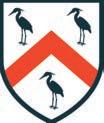

We have a wide selection of School merchandise available for purchase from the LSF website. Orders are usually fulfilled within five working days and both delivery and click-and-collect options are available. To order your items, please visit www.lsf.org/shop and select gifts and merchandise or call 01509 232600.
‘Like’ our Facebook page for event invitations, School news and sharing memories: search @Loughburians
Book events, check out our galleries and find out how you can get involved at www.lsf.org/development
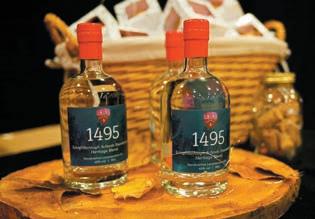
We continue to live in difficult times with threats to our current and future wellbeing on all sides. I hope that the values instilled at your alma mater still define you and that you can draw on the strength of our fellowship. We remain one family unbroken.
Talking of “family”, I want to begin by thanking my Development Office colleagues for their sterling efforts. Regular bulletins, running our website Loughburians Live, getting events up and running again, have kept the home fires burning. Laura-Jane Ryves has recently arrived as the new Director of Development and is already making an impression with her energetic and cheerful style. I would like to thank her predecessor, Andrew Ball, for his contribution.
On departures, a special thank you to Jane Harker (Class of 1972) who has stepped down from the Loughburians Committee after many years of splendid service, notably during her time as
Director of Development, where she was a prime mover in the formation of our current joint alumni association. We wish her a well-deserved healthy and happy retirement in the South-West with her husband Richard, formerly the School Bursar and another stalwart from the family. We will also miss LGS Headmaster Duncan Byrne, his wife Marie-Claire and their two sons. In his stead we are already enjoying the pro-active support of Dr Christopher Barnett, interim Headmaster at LGS, in conjunction with the other Heads. Dan Murphy (Class of 1996) has also left the committee after many years of active service. He is replaced as LGS staff representative by another Loughburian, Sam Ferraby (Class of 2011). Last year, I alluded to a review of our association. We want to ensure that we are truly representative of you, our members, and offer something you can enjoy, as well as be proud to be a part of. The committee itself now has
representation from all four schools. However, we recognise that some alumni may want to get involved in particular ways without sitting on a committee. Covid has catalysed remote working and we are very open to this way of interacting to allow more members to get involved from anywhere in the world. Please contact Olivia in the Development Office with any ideas.
Looking forward, please check the website for upcoming events. I hope that our Gala Dinner at The Plaisterers’ Hall in London on 23 April 22 is already in your diaries; it promises to be a very special occasion.
And finally, may I wish you a very Merry Christmas and a healthy, happy and prosperous New Year.
Dr Peter Cannon (Class of 1980) Chair of the Committee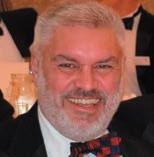
We are excited to welcome Laura-Jane Ryves as our new Director of Development at Loughborough Schools Foundation. Laura-Jane has nine years’ experience in higher education, working in development and alumni relations, and has delivered university-wide engagement and fundraising campaigns at The University of East Anglia, Loughborough University, King’s College London and The University of Kent. Laura-Jane is responsible for school-wide campaigns, alumni engagement and events, alongside philanthropic donations and benefits.

Laura-Jane said, “I’m looking forward to developing a culture of lifelong meaningful relationships and offering more opportunities for alumni to become involved in their School today. Alumni are our greatest ambassadors, and we are extremely grateful to those who act as inspirational role models to current pupils and fellow alumni by sharing their experiences on the journey through school and life beyond.”
“Helping to transform lives through education is one of the reasons why I have chosen a career in philanthropy and alumni engagement. By welcoming girls and boys from all backgrounds into our Schools, our whole community benefits from fresh perspectives, diverse viewpoints, curiosity and challenge.”
“When I was at secondary school, we lost contact with my
dad and my mum was unable to afford school fees for me and my younger brother. At the time, mum was working as a nurse in the operating theatre earning around £17,000 a year. With no bursary provision available, I had to change schools and leave my friends, sports clubs and societies behind at the end of Year 9. The school I ended up in was dubbed as the ‘worst in England’ because of a litany of dreadful exam results, poor basic skills and scores of children bunking off every day. My brother had a very different experience. His school had a bursary programme and this support helped pave the way to his future.”
“Speaking with alumni, it is clear that the support they were given has had a profound impact that has remained with them, long after their school years. I am humbled that so many alumni choose to give back and transform lives by creating bursaries for today’s pupils. In the last year, our donor community helped 25 pupils experiencing financial hardship caused by the pandemic and raised a further £47,120 to support bursary places. I am proud to make my own personal monthly donation in support of bursaries and know that I am helping bring young people, like my brother, to achieve their full potential.”



The 2020-21 academic year has been one that will not be forgotten: 2020-21 saw three lockdowns with boys finally returning to face-to-face classes in March. Although the year was fragmented, the Loughborough Grammar School boys strived for success and achieved record results despite the academic disruption. Results Day saw an abundance of smiling faces belonging to parents, students and the staff members. School achievements included five Oxbridge offers and, on the musical side, two organ scholarships. These results are testament to the outstanding perseverance of the boys throughout uncertain times and the adoption of Microsoft Teams by teaching staff to deliver quality lessons online.
The exceptional work put in by the teachers has to be commended. I would like to personally extend thanks to all of the staff members that are moving on this year. Mr Byrne’s five years here at LGS drew to a close as he handed the baton to Dr Barnett, previous Whitgift Headmaster for 26 years. I am sure that the boys have benefitted from Mr Byrne’s wisdom and charisma, clearly evidenced in his engaging assemblies and in individual conversations with students around campus. Mr Byrne’s full spirited involvement in the Student Takeover Day assembly, when we were ‘kidnapped’ in a coup against our leadership, demonstrated his willingness to join in with the camaraderie. I wish Mr Byrne all the best and welcome Dr Barnett, as
interim Head, into the Foundation. Despite the restrictions placed upon us, with the help of staff we organised Founder’s Dinner and successfully ran, as it always has been, a great night for the boys. The catering team were yet again able to whisk-up an outstanding menu in the space of five days which was greatly appreciated. As I am sure many of you remember, Founder’s Dinner is the culmination of the LGS journey and this year it acted as a principal event after our altered assessments. Another key leavers’ event is the Leavers’ Musical. Unfortunately, this year’s show ‘Grease’ could not be brought to life because of the restrictions; however, we were able to complete the casting thanks to the considerable effort put in from the team of directors. Moreover, the Lower School delivered a fantastic production of Nigel Williams’ Lord of the Flies to an online audience in June and July of this year.
The Combined Cadet Force persevered by delivering content online and face-to-face when we returned to campus. Cadets applied themselves each week to a range of tasks which culminated in the display of expertise on Inspection Day - with the Royal Navy section convincingly winning the Gun Run competition.
This year, Grammar School cadets and staff unveiled a blue plaque at the birthplace of Johnnie Johnson (Class of 1933), RAF pilot who flew and fought during WW2. I would like to thank Major Murphy (Class of 1996)
for his sustained effort as Contingent Commander over the last five years. The School now welcomes Major Ward as the incoming Commander.
On the side of sporting endeavours, there was a severe lack of competitive games due to the pandemic. That being said, Year 13 were able to play a game of touch rugby against Nottingham Trent in May, but the highlight was the Old Loughburians Cricket match in memory of Charlie Wood (Class of 2018). Over the summer months, the weather would not play ball which led to the postponement of many of the Saturday cricket games.
One thing that will be familiar to all LGS boys is the ‘School Captains’ board in the foyer of the Hodson Hall. The last board started in 1922 and ended with my predecessor’s name in 2019; hence, in 2020 I was in the fortuitous position of being the first name on an entirely new school board.
The Foundation has been the centre of not only my life, but also the lives of numerous other boys who have had the benefit of being schooled at LSF for the past fourteen years. To the ‘Class of 2021’: we have grown up together; laughed, cried and yelled together; and I hope that we will grow old together, maintaining the bonds forged over many years here at LGS. My life at LGS has been shaped by my fellow Loughburians, passionate and dedicated teachers and diligent support staff who have all been incredible and helped to nurture the boys to shape them into the men they are today. The opportunities afforded to us have prepared us well for the next stage of our lives. It has been an honour and a privilege to be the Head Boy of LGS for the 2020-21 academic year.


The academic year of 2020-2021 certainly looked rather different from other years, but the new challenges of navigating and adapting to a different way of life in the middle of a global pandemic have undoubtedly made it unforgettable. These hardships have tested both students and staff and have pushed everyone to their limit at times, but every hurdle has been faced with courage and perseverance.
Never have students been more keen to get back to school in September, free from the slog of online learning for good (or at least until January…). After spending the last summer term doing virtual lessons, everyone unanimously came to the conclusion that whilst learning online was a good substitute, especially with the outstanding efforts of our teachers to continue on with the curriculum whilst making the lessons engaging, it ultimately fell short of the real thing.
For many of us, it was also brought home what a privilege it is not only to go to such an amazing school, but to even go to school at all - made all the more poignant as girls in Afghanistan our age are now barred from accessing education at all.
Though back on the school site, the reality of COVID-19 still brought its own trials: masks, social distancing, the subsequent introduction of lateral flow testing and the separation of year groups and even forms from each other, with assemblies and clubs also becoming virtual. The loss of the valuable interactions between year groups was keenly felt.
However, whilst we missed all being squished together in the
school hall, assemblies online also gave opportunities for new voices to be heard, with students speaking on voting, ‘Black Lives Matter’, ‘International Women’s Day’ and ‘A thousand girls, a thousand futures’, to name just a few.
The talent exhibited in performances for virtual house drama, music and dance was not affected by the challenge of the new medium, and some brilliant individuals still managed to blow everyone away. Whilst many of the usual school events were not possible, certain fixtures would have to go ahead no matter what, even if in a novel way: the Christmas Panto was at the top of the list of priorities, along with Tableaux of course.
Amazingly, although it wasn’t possible to invite guests and fellow students in to watch, Tableaux was realised through an ambitious but ultimately successful arrangement: it was all fitted into one day only, with a camera crew ready to film and photograph, whilst the Year 13
participants needed to manage their own costumes and make-up, as well as doing the scene-shifting, all whilst negotiating ‘bubbles’.
A definite highlight would have to be the non-school uniform days, where the pent-up energy from lockdown restrictions led to some epic outfits. It saw girls dressed as movie characters and styling themselves as superheroes, spanning from the Incredibles to celebrating the real -life superheroes of our healthcare system.

While every year group faced academic challenges in reviewing lockdown content, the Year 11s and Year 13s deserve a special mention for how they have faced the uncertainties of what exams could possibly look like, if they were to even go ahead… At times it felt like it was changing weekly!
This past year has brought home to me what a special place LHS is and how I honestly couldn’t have asked for a better group of people to be my side through these uncertain times. I am so grateful for all that this school has given me and taught me, and it has been such a privilege to spend the last seven years alongside such an amazing group of girls.
A massive thank you to all the teachers who have gone above and beyond to look out for us and given us such amazing memories of our time at LHS. Good luck to everyone!


Iam lucky enough to have both a historical and a present connection at Loughborough Amherst School as my Mum, Aunties and Uncles attended the schools within the Foundation and now my brothers, cousins and I are following in their footsteps- making it a very cherished place for my family.
However, the beginning of my journey at Loughborough Amherst School was different to most. I started at the end of Year 8 just two days after my family and I had moved here from Australia.
Unfortunately, the change in climate was not all I had to get used to. Academically, I was a year and a half behind my peers, I had to break into established social groups and the netball team was full- so not the easiest of starts. However, the small class sizes and the dedicated teachers suited me perfectly and although the climate was a little chilly, a warm welcome was given to me by students and staff and I definitely knew that my journey ahead would not be a lonely one.
2020-2021, a year where face to face learning was replaced with Teams meetings and Zoom calls, whole school assemblies replaced with year group bubbles and smiling faces were covered
by masks. But regardless, Amherst was doing what it has always done. Amherst was continuing to teach us how to live, learn and grow. Every day, students at Amherst are supported, encouraged, challenged, praised, corrected, enlightened, celebrated. This didn’t change – these acts continued because we are Amherst.
Every student should be extremely proud for not just surviving the past 15 months, but for smashing it out of the park as it has been a collected effort of hearts and minds that has meant Amherst remains a place of learning, growth and enrichment.

This year has been full of some amazing activities and events including our very successful HelloYellow day (showing our support for young people dealing with mental health challenges), reopening of sports clubs, lunchtime dance competitions, staff/student Christmas nativity, lockdown challenges, World Book Day, the Easter Lockdown Live concert, our annual Burton Services, sports days and many more. One of my personal favourites was our Year 13 Leavers’ Week - from jumping off inflatable obstacles at Rutland water, to our school sleepover and singing in the
Chapel at 12am, to the unforgettable leavers’ meal.
I would like thank Dr Murphy for how he has steered Amherst over the past few months. He set our course and helped us believe we could continue to succeed. We really couldn’t have asked more of our Headmaster in such unprecedented times. And a massive thank you to all the teachers - this year we have truly learnt the importance of their guidance and support, perhaps before too easily taken for granted and undervalued.
I hope I speak for all students at Amherst, when I say that, in a year where many of our plans have been replaced with uncertainty, the spirit we have learned at Amherst offers us reassurance in knowing that despite even the greatest challenges, we can go on to achieve great things and carve out our own path in an ever-changing world. I will be forever grateful to Amherst for shaping me into the confident, ambitious and resilient person I am becoming. I will miss the undeniable community spirit that radiates from our students, teachers and the Sisters and I am extremely grateful for my time spent at Amherst with an amazing group of friends and teachers.



You can listen to these talks online: vimeo.com/user128069309
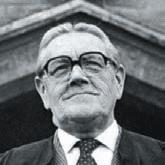

18 February 2021 • John Weitzel (LGS Archivist)
LGS legend John Weitzel illustrated the life of fellow LGS legend Johnnie Johnson.
28 June 2021 • John Weitzel (LGS Archivist)
On Friday 28th June 1996 Her Majesty the Queen visited Loughborough Grammar School. Pupils from all the Schools enjoyed the occasion despite the terrible weather, but there were few there that day who will have appreciated the huge amount of preparation that went on behind the scenes to ensure the visit ran without a hitch. 25 years to the day, John Weitzel tells the story of this eventful day.
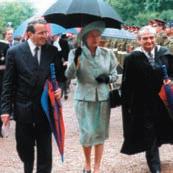
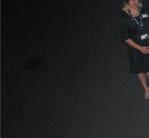

6 May 2021 • John Weitzel (LGS Archivist)
John Weitzel guided us through the extraordinary life of Colin Tivey (CPT) and his contribution to the history of the School as both a pupil and long-standing member of staff. CPT is often a feature of school-based recollections we hear from our alumni. As well as hearing a potted history from John, there was a wonderful opportunity for our audience to participate and share memories. It was a very moving evening.
25 March 2021 • Matt Bull (Class of 1998)


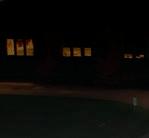
Matt, Director of Coaching at Action Coach, looked at how you can deal with pressure more effectively and make it your friend not your enemy. Participants were invited to consider resilience, overcoming fear, the power of choice and the cost of allowing fear to block opportunity.

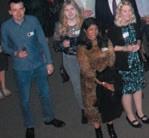
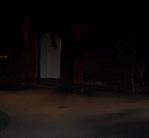
DINNER
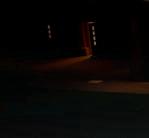
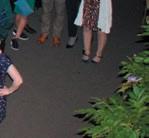
25 SEPTEMBER 2021
The coronavirus pandemic meant we had some catching up to do with our year group reunions so this September the Classes of 2000, 2001, 2010 and 2011 came together for a combined 10 and 20 year reunion. 62 alumni from all three Schools enjoyed tours and a delicious meal before reminiscing over the archive tables.
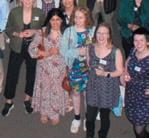
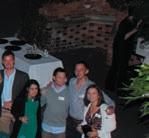
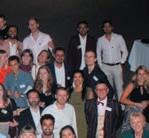
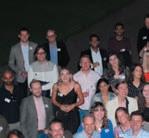
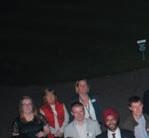

On 28 August 2021, on what would have been their 73rd wedding anniversary, we were delighted to host a small gathering of family and friends to celebrate the lives of Don and Pat Wood and to dedicate Lecture Theatre (L1) at Loughborough Grammar School in their memory.
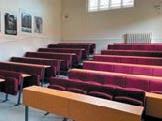
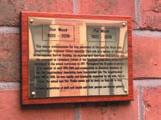

Don was a classics teacher at the school for 34 years. Involved in all aspects of school life in his time at LGS, from CCF to ballroom dancing, his dedication to the school was matched by his wife Pat. Even in retirement, Don served the school as Chair of the OLA for a further 23 years. Learn more about them in the Winter 2019 edition of Beyond the Barrier which you can find on the Resources Section of Loughburians Live.
The Don and Pat Wood Lecture Theatre was officially dedicated to the couple following an ‘In Memory’ gift from Don’s nephew Brian Wood which enabled the complete refurbishment of the room. Don’s wish was to be reunited with Pat and be laid to rest at their beloved LGS. The commemoration, conducted by Canon Tony Cox, former LGS Chaplain, included a time for reflection during The School Hymn and an ode to a Teacher’s Great Expectations.
If you would like to remember your School in your Will, we would love to be able to thank you in your lifetime for your generosity. To find out more about in memory giving and leaving a legacy to School, or to discuss, in confidence, your intentions in more detail, please contact Natalie Savage in the Development Office on 01509 638921.
The first Loughburian event for the ‘Class of 2021’ was Quad Fest. This opportunity enabled students from the three schools to see each other one more time before departing on their post-18 journeys. We were joined by the year preceding us – the Class of 2020.
Guests flooded through the school gates and under the tower (a walk which once seemed so regular) at 6pm whilst being snapped by the photographer and then receiving their food token and Loughborough Alumni Association cup for the night.
Quad Fest aimed to provide alumni and staff from the previous two years an opportunity to catch up after a long summer and to acknowledge the fact that both year groups missed the usual leavers’ celebrations due to the pandemic. With around 250 attendees, the sun shone, the live band

played, and both alumni and school staff made great use of the open bar! Guests gathered in groups and reminisced about both the summer and Loughborough Schools Foundation - a great opportunity to relive fond memories. Food vans allowed no one to go hungry on the fine Friday night after which many alumni seized the chance to celebrate together in Loughborough.
The event was seen as valuable by all and opened the door for future events and reunions which are highly anticipated in the years to come. My thanks go to the Development Office which yet again did an outstanding job of bringing the Classes of 2020 and 2021 together for a fantastic night. At the same time, Quad Fest provided the newest Loughburians the opportunity to view the newly-turfed Quadrangle after 102 years of use.
Finley Parsons (Class of 2021)


18 & 19 SEPTEMBER 2021

Postponed from the 525 celebrations in 2020, John Weitzel’s plans to open the Grammar School archive and tower for the first ever Heritage Open Day to the wider community, finally happened on 18 and 19 September.


Over Saturday and Sunday more than 300 people visited the School and climbed the landmark tower to survey the fabulous views and splendid grass on the quad. Visitors ranged from those interested in local history to curious locals who always wanted to look inside - and of course we were delighted to welcome so many alumni.
The Open Days afforded a number of alumni the first opportunity to come into the School since the 1950s, retelling their experiences of Mr Murray of whom the Biology department is named. Also attending was John Mulcahy (Class of 1951) whose mother, Clair Mulcahy, was the first female member of staff at LGS teaching English and Latin between 1941 and 1964. Many current staff and pupils attended and climbed to the very top of the tower for the first time. The visitors also had the opportunity to see pictures from the Victorian period of the School, the original school contract, profiles of those old boys lost in the world wars, a Johnny Johnson display and access to the expansive digital school archive. We were encouraged to open again for Heritage Open Day 2022 and perhaps for that we will open up the WWII air-raid shelter!
It was a great privilege to be asked to become the 36th Headmaster of the Grammar School, and I am much enjoying the first of my three terms here. My wife, Shirley, and I have much appreciated the warm welcome we have received.
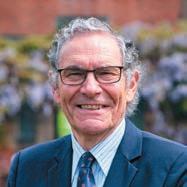
The whole-school assembly in the Hodson Hall, with which we began the School Year, was a very special occasion when nearly 1,000 boys and staff came together. For many boys, it was the first occasion, because of COVID-19 restrictions, when they could experience an event of this kind. For all of us, it was a welcome sign of a return to normality after all the restrictions of the past 18 months.
Staff and boys alike have shown their commitment to the School in so many ways already this term, excellent academic endeavour being matched by the skills on display from our sportsmen, great musicianship and many other strong, co-curricular contributions. The current 16As, as yet unbeaten this season, are a fine young side and promise much as they progress into the Sixth Form.
The most impressive event of the term so far has been the Remembrance Service held in our historic Quad. The CCF contributed with distinction, all its members showing a calm professionalism typified by Patrick Culshaw, our superb bugler. The whole School assembled on the immaculate lawns for the first time since they were re-laid this summer, having lain undisturbed for the previous
hundred years. I chose Marian Allen’s haunting memorial to the fiancé she lost in 1917, from her poem The Wind on the Downs, to represent all those men from the Grammar School who died in the First and Second World Wars and subsequent conflict, read by our Senior Deputy, Mrs Foster. It begins:
I like to think of you as brown and tall, As strong and living as you used to be, In khaki tunic, Sam Brown belt and all, And standing there and laughing down at me.
Because they tell me, dear, that you are dead…
Our wreath-laying, the playing of the musicians, the singing of ‘Oh God, our help in ages past’ and John Marsden’s memorable display in the Tower, entitled The Cruel Sea, completed a very moving commemoration of which all of us can be proud to have been a part.
For our Diwali Assembly, with candles, drummer and poetry readings in what was Poetry Week, I contributed a few verses of my own, including
Where darkness now a conqueror meets, Millions of lights, in homes and streets, In sparkles, swathes and shafts so bright Little by little overcome night...
…With family and friends and neighbours too, The Festival is spent, now also with you, As Rama, Sita and Lakshmana return May the spirit they light up forever burn.
Respect for everyone, for the history, culture and beliefs of all those who make up this school community, has been one of the common threads running through
our assemblies and our LGS lives in general. I believe it is one of the Grammar School’s greatest strengths.
Earlier in the term, we welcomed Joe Choong, Gold Medallist in the Modern Pentathlon at the Tokyo Olympic Games, to the Grammar School. Joe, a former student of mine, stayed a full day with us, addressing the whole School, meeting boys, staff and parents, and taking lessons in the Sports Hall. The gleaming medal itself, heavier than we had imagined, was a thrilling sight. Now that we have introduced Pentathlon as a sport, perhaps in a decade or so one of our boys will be challenging for honours. Many of our own prize winners were celebrated at Senior Prize Giving, where we welcomed Nigel Mills, Member of Parliament for Amber Valley, back to his old School.
I have set as the principal tasks for my Headship to enhance the education offered to the boys wherever I can, to help them to grow in confidence and achievement, and to smooth the way for my successor. I know already that, when the time comes all too soon, I shall much miss this fine School and its boys who are a great credit to Loughborough Grammar School.
SATURDAY 20 NOVEMBER 2021
We were delighted to welcome alumni from the Classes of 1960, 1961, 1970, 1971, 1980, 1981 1990 and 1991 back to School for our last reunion of 2021. Many were visiting for the first time since leaving School. The tours were a particular highlight with alumni climbing the LGS tower, finding themselves on whole school photographs and reminiscing about ballroom dancing and tableaux.

We are delighted to announce that the Governors have appointed Dr Daniel Koch as our new LGS Headmaster to commence in the Autumn Term 2022.

Daniel is currently the Senior Deputy Head (Vice Master) at Bedford School. Prior to Bedford, he was Head of Sixth Form at South Hampstead High School in London, having previously also worked as Head of History and a resident boarding tutor at Worth School in West Sussex.
Dr Koch is originally from upstate New York and has lived in England since 2003. He completed a D.Phil. (Ph.D.) at the University of Oxford supported by an Overseas Research Studentship. He studied History and French as an undergraduate at the State University of New York at Albany on a Presidential Scholarship, graduating with the highest distinction. He spent a term at the Sorbonne, Université de Paris, as part of his degree. He also lived in Germany and taught English as a second language there.

Looking back to September 2020, I don’t think anybody would have ever imagined that we would still be running our staggered pick-ups and drop offs eleven months later, as well as keeping the children in their class bubbles on the last day of the summer term!
That said, I am incredibly proud of what my staff have achieved over the course of the last academic year in the most challenging of circumstances. The last three weeks of the summer term clearly demonstrated the lengths the staff went to in organising events for the children, enabling them to finish the year on a real high. Having witnessed first-hand the benefits of the Year 6 disco and trip to Twin Lakes in the last week of the summer term, it is certainly true to say that the staff certainly pulled out all the stops to give the children a spectacular end to their final year.
It seems only appropriate at this juncture to take the opportunity to highlight a new and exciting development at Fairfield Prep School regarding Year 6 transition through to Loughborough Grammar School, Loughborough High School and Loughborough Amherst School.
As you are probably aware, particularly those of you who are former pupils of Fairfield, every Year 6 child would normally have to sit an entrance examination alongside other external candidates in January, in order to secure a Year 7 place at one of the Senior Schools within the Foundation.
We are therefore delighted to announce
Growing up in New York, he played American Football and Baseball. At Oxford, he rowed in the Christ Church 1st VIII. Currently he coaches rugby and enjoys running and triathlon.
Dr Koch is the author of Ralph Waldo Emerson in Europe: Class, Race and Revolution in the Making of an American Thinker, published in 2012 and recently reissued by Bloomsbury in paperback. He has contributed several academic chapters and articles to various scholarly publications and has written for a range of popular periodicals and newspapers as well.
Daniel and his wife, Laura, are looking forward to moving to Loughborough whilst their two sons, Samuel and Jacob, are very excited at the prospect of living near the National Space Centre and hope to join Fairfield in September.
I am sure you will all join us in welcoming Daniel and his family to Loughborough Grammar School and the Foundation in due course.
that Fairfield Prep School will now guarantee Foundation Year 7 places for pupils in Year 5 before they move up to their final year in September. This approach will remove the hurdle and the often associated anxieties of Year 6 Fairfield pupils having to sit the Year 7 entrance examinations.
For the first time in Fairfield’s impressive history, parents of pupils who have been at Fairfield since Year 3, will be informed as to which schools their child has been guaranteed a place, based on our internal tracking data. Furthermore, scholarships will be awarded to Fairfield’s top three performing Year 6 boys and girls for Loughborough Grammar School and Loughborough High School, again using our internal tracking data. These six pupils will subsequently be known as the ‘Fairfield Scholars’.
We have also taken a similar approach for entry into Reception from our Kindergarten Unit. Parents of children who join our Kindergarten prior to the October half term will be notified by the end of the Autumn term of their offer of a Reception place for the following September.
This decision will be based on a child’s attitude to learning, as well as behaviour, which will be assessed through ongoing observations whilst in the Kindergarten Unit. A separate entrance assessment in January will therefore not be required for children who joined Fairfield Kindergarten prior to October half term and who will have met the aforementioned criteria. I do hope that you will welcome this as a positive innovation and if you know of anyone who is interested in taking up a place at Fairfield, then please do ask them to contact Mrs Hannah Wyatt, Registrar: www.lsf.org/fairfield
15 September 2021 • Nigel Mills (Class of 1993)
After 18 months of only ‘virtual’ Prize Givings, the School was delighted to have Nigel Mills M.P. as its speaker in September 2021, having originally been ‘lined up’ to be the guest for the 525th anniversary Prize Giving in 2020.


Nigel joined the School in 1986 from Fairfield and was a prize winner himself winning the Classics Prize in both the Lower Sixth and Upper Sixth before heading to Newcastle University to read Classics. After graduation, he qualified as a chartered accountant and worked with PricewaterhouseCoopers and Deloitte.
At School he always showed an interest in politics and in 2004 he was elected as a Conservative Councillor for Amber Valley
Borough Council. Six years later, in the 2010 General Election, he became Amber Valley’s MP, winning the seat with a majority of 536. Since then he has retained the seat in every election, increasing his majority each time.
He is the School’s third MP, following in the footsteps of Sir Samuel Chapman (LGS 1880 – 1886) and Charles McCurdy (LGS 1881-87), and we were delighted that he actually managed to ‘get permission’ to leave Westminster - exactly 100 years earlier, Charles McCurdy was due to host Prize Giving but had to cancel on the day due to parliamentary business.
When showing alumni from the 1940s, 50s and 60s around the School, one former staff name repeatedly comes up in conversation – Clair Mulcahy. Clair was appointed to LGS in 1941 and was the first permanent, full-time female member of staff at the school. It is clear from recollections and stories that she was a formidable woman and left her mark on any boy she taught.

In conjunction with her son, John (Class of 1951) – a pupil at the School from the age of 8 – we decided to recognise her achievement and significance in the history of the School with a plaque. This is displayed in B1 where she taught and I was delighted to meet up with John on Heritage Weekend.
John Weitzel - LGS ArchivistTwenty years following his death, the County publicly honoured and remembered one of its most famous sons in two different ways during 2021. In Loughborough, a giant mural, located at the junction of New King Street and Great Central Road, paid tribute to the RAF Spitfire pilot who shot down more enemy aircraft than any other Allied pilot in the Second World War.

Painted by Dan Smith (known as Buber Nebz), the work is part of the ‘Ladybird Collective’ set up by Loughburians Nick Hardy (Class of 1963) and Councillor Ted Parton (Class of 1990) and is on the wall of a property owned by local businessman Andy Moore, proprietor of Print Monkey. Its position is perfect, being between the Cobden Street School, where Johnnie was a pupil until he was nine, and LGS. For the first three years at LGS, until he boarded, he would have walked past this wall on his way to School and back from the family home on Meadow Lane.
The mural was completed at the end of January and then in the Summer, on Saturday 26 June, Armed Forces Day, the School was well represented at the unveiling of a blue plaque at Johnnie’s birthplace—21 Warner Street in Barrow-upon-Soar. He was born there on Tuesday 9 March 1915. John Weitzel, LGS Archivist, spoke about his childhood in both Barrow and Loughborough before Johnnie’s son, Christopher, unveiled the plaque and ended his short address with the following words:
 Pictured left to right:- Wing-Commander Peter Sergeant; Christopher Johnson; RAF Cadets Ed and Sam, Councillor Pauline Ranson
Pictured left to right:- Wing-Commander Peter Sergeant; Christopher Johnson; RAF Cadets Ed and Sam, Councillor Pauline Ranson
“Johnnie would have appreciated seeing the RAF Cadets here as he always believed today’s youth would serve, if called upon, with the same distinction as he and his comrades did.”
Martin Day, the main character of The Naxos Mysteries, sprang into my imagination long ago as I slumbered on a long-haul flight. The plot of the first book, The Meaning of Friday, was outlined before we landed. I scribbled it down when the cabin lights came on and eventually threw the notebook into a desk drawer, there to remain until COVID-19. In the strange vacuum of the first lockdown, I retrieved the notebook. The book was intended to cheer its readers, but it cheered me to write it. It was as close to being in Greece as I could get.
I have spent more than fifteen years visiting Greece and travelling round its ancient sites, often in the company of archaeologists; my husband Alan and I particularly love Naxos. Naxos is a large Cycladic island with excellent cuisine and a significant historical heritage. The books, therefore, feature Greek antiquities or the beauties of Greek art, as well as the cuisine of the Cyclades and a modicum of Greek wine. There also has to be, naturally, the occasional suspicious death. It’s a rather important element in the genre.
I joined a growing number of writers who use a non-traditional route to publication. The Naxos Mysteries books have been published using an excellent small company called Dolman Scott. I wrote my first ‘novel’ while still at school, inspired by the teaching of Judith Coe and Nancy Rizzo, when this exciting way to get work in front of readers did not exist. If it had, I wonder what they would have written.

Non-traditional publication involves a great many people, not least proofreaders. My favourite reader is my lifelong friend from school, Christine Wilding (née Hughes, Class of 1974), whose comments make me laugh, blush and re-think. My husband’s outstanding photographs of Naxos have provided the images for the book covers. My designer at Dolman Scott is an unnamed person in ‘the Studio’, but I cannot adequately thank them.
The Meaning of Friday, although mostly concerned with an undiscovered Bronze Age site, opens with an isolated shepherd’s shelter on Naxos that really exists. It is a perfect place to hide something. Martin Day is an archaeologist; he is flawed in some ways but is brilliant, a capable and persistent man, so I gave him the job of dealing with what is found inside the shelter. As
the mystery darkens and the Greek police become involved, the ‘Viking Policeman’ makes his first appearance, a Greek police inspector with a Norwegian heritage and a passion for working on international antiquities crime. The book’s eventual resolution took even me by surprise, ensuring that I was truly hooked as Martin Day’s creator and already considering his next challenge.
As soon as The Meaning of Friday was in print, I gave a copy to my dear friend Mary Chipperfield. Mary taught me French throughout my time at Loughborough High School, and we met again in 2018. Mary retired to Wales where she and her friends

Bron Roberts (Art) and Pam Hadley (Headmistress, Classics) eventually had a house built to their own design with a stunning view of one of the mountains of Snowdonia. I had meant to go and see them long before, but waited too long, and only after the passing of both Miss Roberts and Miss Hadley did I write to Mary to offer my condolences. We exchanged letters - hers handwritten in a script that took me straight back to school, mine mostly typed to ensure legibility. After a few months of correspondence, we went to Snowdonia to meet her. I took whatever memorabilia I could find from High School days, including the school magazine which she examined with great joy. Mary has other friends who, like me, are her ‘old girls’, some of whom travel even further than we do to see her. Each one has some special connection with her. Mine has turned out to be books, which I post or take to her, and she gathers together a pile to give to me when we visit. During the long period of Covid-19 when travel was impossible, a great many books made their way to North Wales.
Among the books that I have given to Mary, of course, are my own. She is my best critic. Now, at the age of 98, she still corrects my work. She not only enjoyed reading The Meaning of Friday, she telephoned me to talk about it most days and eventually wrote a letter to point out ‘a few little errors in the text’. She still has very sharp eyes and is a keen love of grammar. She has also considerably enriched our lives, so much so that I dedicated the second book to her.
Mary’s Book, as it has become known, is officially called The Search for Artemis. It gave me

a chance to write about Greek marble, for which Naxos is famous.
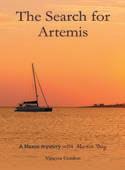
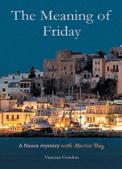
I was inspired by meeting a marble artist on the neighbouring island of Paros, a creative and charismatic man who is reflected in my fictional sculptor, Konstantinos Saris. Another inspiration was a contemporary oil painting of a Greek girl, simply called ‘Angelika’. I cannot trace the Greek artist or ask permission to use the portrait in the book, but his Angelika has another life in The Search for Artemis
Before Dolman Scott could bring out Mary’s Book, I was writing the third in the series, Black Acorns (due for publication November 2021). 2020 was a bumper year for acorns; we have six oak trees and had to gather up hundreds of them. This was how I discovered that there are occasionally black ones, the result of tree damage or blight. The idea came to me that this could be a
useful metaphor, and the story began to take shape. The book explores Naxos’s stunning Venetian towers, which are interesting places especially if one of them contains a small bronze figurine over a thousand years older than the tower. The Naxos Literary Festival takes place in another Venetian tower, bringing an important character to Naxos and forcing Day to confront unresolved personal issues from his own past.
Any day now I shall send a copy of Black Acorns to Mary. I know she will read it carefully and with pleasure, occasionally wielding her pencil (red pen) and casually letting slip some acute insights.
Vanessa studied English at Exeter University and obtained a doctorate from the University of London (Bedford College). The Naxos Mysteries with Martin Day (The Meaning of Friday, The Search for Artemis and Black Acorns) are available from Amazon as paperback and Kindle editions, and are to order from bookshops. See www.martindaymysteries.co.uk or contact Vanessa on v@vanessagordon.co.uk
At the beginning of the first lockdown in March 2020, The King Lear Prizes competition was launched to encourage the over-65 age group in the creative fields of music, art, poetry and story-writing. Inspired, I submitted a children’s song entitled The Ballroom Dancing Ostrich and was delighted to receive a “highly commended” award.
This year the competition ran again and, spurred on by the previous year’s commendation, I entered two songs: one original composition and one cover of a song called Moonlight in Vermont from the Great American Songbook genre (think Gershwin, Cole Porter, Irving Berlin, Rodgers and Hart, Johnny Mercer et al). The head judge was Julian Lloyd Webber, the celebrated cellist and brother of Sir Andrew.
In August my entry of Moonlight in Vermont was judged to be the winner out of the thousands of entries submitted. This was an honour indeed and Julian Lloyd Webber’s comment was: “The performance expertly conjures up the atmosphere of a moonlit night in Vermont. Nice, laid-back jazzy chords!”
Whilst there was a small pecuniary award, the act of winning was far greater!
When I was at school, the music masters of those early sixties were “Reggie” Shields, Mr Stevenson and John Moore. Johnny Lello and Mr Kitching were also talented musicians but specialised in other subjects. I well remember Mr Stevenson and Mr Kitching reprising brilliantly Flanders and

Swann’s Mud, Mud, Glorious Mud at a school revue in the early sixties in the newly built Hodson Hall. Those masters were all inspirational in their different ways and certainly influenced my love of music albeit blues and jazz were my first choices.
Although my “day job” has been in the sport, leisure and recreation management field, I have played extensively in pubs, clubs, restaurants, holiday parks and for “weddings, funerals and bar mitzvahs”. I have also made TV and radio appearances and met many famous stars of the day such as Frank Sinatra, P J Proby, Shakin’ Stevens, the Two Ronnies, Michael Ball and many others too numerous to mention here.
At 74, I am still playing occasional gigs with like-minded “jazzers” - although I think I am the oldest! I am grateful to the King Lear Prizes competition for providing the motivation to keep playing otherwise my guitar would be sitting in the corner of the room “gently weeping”!
The Ballroom Dancing Ostrich can be found at www.youtube.com/watch?v=Tsx9dsd5FF0
Colin’s version of Moonlight in Vermont can be enjoyed at www.youtube.com/watch?v=vsGtZZL2tBc

Colin would like to encourage all those eligible and interested to get involved with King Lear Prizes – aimed at those over 65, keen amateurs or first-timers rather than professionals, wanting to participate in literature, drama, poetry, music and art. www.kinglearprozes.org.uk
 From the Old Boys News section of a 1974 copy of The Loughburian
From the Old Boys News section of a 1974 copy of The Loughburian
Although school life will always have an academic focus, for me it was those extra opportunities offered at Amherst that have helped set me on my latest journey studying Mechanical Engineering at the University of Plymouth.
My sailing journey began in the summer of 2014 when I went for a week sailing from Brixham to Falmouth with my Guide unit. I fell in love with sailing on tall ships and have been every summer since then! The first four years were with an organisation called the Tall Ship Youth Trust on a ship called Stavros S Niarchos, a tall ship 195 feet in length. She can carry 61 people on board.

Following the sale of Stavros in 2018, I joined another tall ship Tenacious for a voyage on which there was a mixed ability crew and a specially adapted mast enabling wheelchair users to be hoisted aloft. Speaking to one of the Officers on Tenacious, I was advised to try a tall ship race and was accepted onto the 2019 international tall ship race; we sailed from Bergen in Norway to Aarhus, Denmark on the Blue Clipper
In Summer 2020, I sailed on a fourth tall ship called Pelican of London; we sailed from Sharpness to Liverpool via Folkestone on a voyage sponsored and overseen by Darwin200. Darwin200 is an environmental project looking at the world’s ocean health whilst re-tracing the global voyage undertaken by Charles Darwin in 1831-36 on HMS Beagle. Darwin200 partnered with the University of Plymouth and the ship was fitted out as a floating laboratory to study conservation and wildlife. Our purpose on this voyage was to test the equipment on board in preparation for the global voyage which will take place in 2023-25. In 2020, I travelled the first half of the circumnavigation of the British Isles; this summer, I completed the last third of the circumnavigation of the British Isles from Portree on the Isle of Skye to alongside HMS Belfast on the River Thames, again on the Pelican of London, as part of the second test voyage for Darwin200.

Over the same time period, CCF (Combined Cadet Force) in school was playing a big part in my life. Joining the Navy division seemed like an obvious decision and afforded opportunities for sailing beyond just these. There is very much an ethos of leadership and
teamwork in all that happens within CCF. When working on a boat teamwork is one of the main priorities as there are lots of tasks needing more than one person to complete and there are often groups of people working simultaneously towards the same goals on different tasks. For example, stowing the sail requires the coordinated efforts of people up aloft working with the sail, and other people on the deck working with the sheets and the tacks. Working in the galley to feed the crew requires three additional people each day to gather the stores and help prepare and serve food to the crew. The crew is split into three watches and for each 24-hour period each watch will be ‘in charge’ with the help of an Officer for four hours at a time, with roughly an eight-hour break between each watch. Other school activities have also helped develop valuable skills I use in my sailing. I gained my Level 2 Sports Leadership qualification and completed the Gold Duke of Edinburgh’s award, my residential being on the Tenacious
Over the last couple of years, I have focussed more on the engineering side of sailing. When I first started my A levels in Maths and Physics, I assisted the engineer John on Blue Clipper - it was insightful for me to examine the workings of the engine and encouraged me to look for an undergraduate course in Engineering. In the last year I had a chance to physically help Patrick and John, the Pelican’s engineers. I am now hoping to specialise in Marine Technology in the second year of my Mechanical Engineering studies. I chose to study in Plymouth as it has connections to the Navy and sailing - my long term ambition is to be a Royal Navy Engineer.
CCF has been massively influential in my life and I would recommend it to all those students who follow me. The CCF has made it possible for me to have amazing experiences aboard very exciting ships and the sense of achievement of completing tasks as a team. It has encouraged me to go for a dream career in the Royal Navy as an Engineer and I am so grateful for the opportunities that have been opened up to me.
Dr Julian Murphy, LAS Headmaster

The summer of 2021 saw the completion of the first phase of our plan to turn Loughborough Amherst School into one of the finest and most sought-after independent schools in the Midlands.
The aims of this first phase were to establish a strong and growing word-ofmouth reputation for the school as a place of outstanding pupil care and great academic results; to grow the school above 300 on roll so as to make it much more financially secure for the future; to overhaul the teaching staff and create an unusually effective and tight-knit body of teachers, and, finally, to achieve a strong ‘value-added’ measure in public examination results. All four of these targets have now been achieved. In particular, we have achieved continuous and impressive growth in numbers on roll for several years in a row, and an overall growth of 60% during the last five years.
This summer’s results were 35% A*-A and 42% A*-B at A Level, which was 28% above the national average. At GCSE our pupils achieved 22% grades 9-8 and 42% grades 9-7, which was 14% above the national average. Although the actual grades for results in 2020 and 2021 should be taken with a slight pinch of salt, it is nonetheless pleasing to see that our position in regard to national average results continues to rise year-on-year.
This success is the result of having a firm, ambitious and unwavering vision, and a team of staff with the enthusiasm, skill, and work ethic necessary to make that vision a reality. It has also been greatly helped by the very vocal support and ambassadorship of our parents, to whom we are - as eververy grateful.
As we have gradually emerged from lockdown, we have taken the opportunity to review and improve many aspects of our community and extra-curricular life. Following parent and pupil surveys, our extra-curricular offering has been thoroughly overhauled, and we are now offering a much wider range of clubs and activities. It is particularly pleasing to me to see the successful launch of our eco-gardening club and our debating society. The restructuring of sports staffing across the Foundation has also enabled us to further improve our PE and games curriculum. We remain very grateful to Loughborough Grammar School for opening access to their afternoon games programme as an option for those of our boys who prefer rugby to football.
The expansion of the school has necessitated the creation of a completely new classroom in the area where my office used to be, along with the creation of a new computing
room. We have also created a new Sixth Form Art room, extended the facilities in the Food room and (finally) created a proper department area for Religious Education. This year has seen us make some changes to our morning rota to create more time for the celebration of spiritual life and the promotion of a healthy reading culture. Friday mornings are now devoted to weekly spiritual life meetings within year groups, with the whole school gathering every third or fourth Friday for an act of worship led by the pupils from a particular year. Staying on the theme of spiritual life, one of the greatest pleasures of emerging from lockdown has been the return of School Mass. My particular thanks to our celebrant, Fr David from St Mary’s in Loughborough, who is working with such enthusiasm and such a great instinctive feel for how to help non-Catholic pupils feel both informed and comfortable in Mass.
Thursday mornings see us splitting into year groups for Book Club, in which students select a book from a shortlist of choices presented every eight weeks and then gather in small discussion groups with those who have selected the same choice of book. I am enjoying working with Year 13 in their Book Club, where the choices so far have been The Road by Cormac McCarthy; Girl, Woman, Other by Bernadine Evaristo, and Hamnet by Maggie O’Farrell.
This September saw the launch of the second phase of Amherst’s development plan, in which we are turning our focus to the ongoing improvement of the learning culture within the School. The aim here is not just to continue raising examination results, but – perhaps more importantly – to provide our pupils with solid bedrock of growth mindset and work and emotional skills that they can take with them into their adult life. The name we give to this overall learning culture is our Minerva programme, and it is broken down into four main areas of focus, each of which can be expressed as a question or questions, as follows:
The learning environment – are our expectations of behaviour, dress, and academic focus such that they guarantee a calm and purposeful atmosphere and greatly increase the chances of producing strong yet empathetic leaders of the future?
Knowledge and confidence – do we take every step we can to minimise extrinsic cognitive load and maximise intrinsic cognitive load for our learners? Do we take every step we can to ensure the successful transference of information from short to long-term memory?
Learner mindset – do our habitual ways of working and speaking really nurture resilient, creative learners who can enjoy their work?
Articulation – do we force our learners to articulate their thoughts and defend their ideas?
If you are interested in learning more about how our Minerva programme works, please contact the Development Office, who will be delighted to email you a copy of our Minerva booklet.
We would like to congratulate LHS alum Grace Davies (Class of 1999), Senior Deputy Head at Amherst, on the birth of Rory on 3 May 2021. She is on maternity leave at the moment and describes having Rory as the best thing she has ever done – despite the current lack of sleep! Grace is looking forward to seeing Rory’s godfather Richard Winstanley (Class of 2000) back in the UK soon.

When writing this time last year, I could hardly have imagined that two more lockdowns and another disrupted summer were still to come. Students, parents and staff have met the challenges of the last year with incredible courage, empathy and resilience, finding new ways to communicate and maintain our sense of community at Loughborough High school. From virtual parents’ evenings to live-streamed assemblies and online House events, the pandemic has transformed our daily lives and will no doubt leave its mark on the way that we work as a school for years to come.
Once again, public examinations were cancelled and grades were awarded by teachers, following a rigorous and evidence-based process. We are immensely proud of the stellar achievements of our pupils, not least because almost all of our A Level students secured their first choice of university on results day. Half of our Year 13 leavers are now pursuing STEM courses, including 22 who are studying medicine, dentistry, veterinary medicine and allied courses. 31 students have chosen arts courses with two applying to specialist performing arts schools. A number of others are taking gap years at home and abroad, including the winner of the Joanna Dyer Travel Award, who will be volunteering overseas with Project Trust.
As we emerge from the long tunnel of the COVID-19 pandemic, there is real cause for optimism. With the relaxation of restrictions this term, we have been able to experience in person the richness and variety of life at LHS. A particular highlight has been our Space Day, launched by Dr Maggie Aderin-Pocock, who spoke about her passion for space science, as well as her experience of dyslexia, prejudice and of working in a profession traditionally dominated by men. Younger pupils then followed a
space-themed programme of activities which included building a Mars base, firing rockets in the quad and enjoying a range of excellent talks by young female scientists, all of which had been organised by our STEM Co-ordinator, Jo Pellereau, and our Head of Futures, Ruth Grainger. In the evening, 200 parents and pupils attended fantastic presentations and demonstrations, including a fascinating talk about space medicine by alum Lauren Church (Class of 2016).
We are proud that LHS continues to be a vibrant, warm and inclusive place, where individuality is celebrated but we know that there is always more for us to do. We have embraced the recommendations of the Foundation-wide review of equality, diversity and inclusion, prioritising our curriculum and staff training over the course of this year. Led by our newly appointed diversity and inclusion prefects, students have been taking the initiative, too, through groups such as Africa Society, FemSoc and Spectrum, and via pupil-led assemblies about Black History Month, Diwali, women’s suffrage and Pride. We are also extremely grateful for the engagement and guidance of a group of LSF alumni who have offered valuable perspectives and practical support in this area, including careers talks, recruitment advice and support for our “Proud to be...” careers initiative to mark Black History Month.
One of our ongoing priorities is to develop young women as leaders of the present and the future. There has never been a more important time for young women’s voices to be heard and the great strength of LHS is that we are experts in putting girls and young women first. Our students love to hear about the varied life experiences of our alumni and to feel a sense of connection with the wider LHS and LSF families. If you have a life story or career path that you would like to share with us, please do get in touch - we would love to hear from you!
Joanna Dyer was a former pupil of LHS who was tragically killed in action in Iraq in April 2007, the only former pupil to have died in action since the end of the Second World War. In addition to the memorials at LHS and LGS there is also a tree in her memory at the National Memorial Arboretum.

The annual Award, made possible through a donation from the family and friends of Joanna, calls for demonstration of the qualities of all-round excellence, leadership and potential that are associated with the late Joanna Dyer.
We are pleased to share, following submission of a project proposal and interview, that the Award was presented this year to Honor Place (Class of 2021). Honor is taking a gap year to travel overseas and to teach as a volunteer with Project Trust in Honduras. The adjudication panel were impressed with Honor’s plans which encompassed the spirit of purpose, imagination and adventure which characterised Joanna’s own travels. It is clear a strong moral purpose and a genuine care for others drove Honor’s decision to volunteer to teach abroad. Honor is looking forward to completing a report on her adventures and to sharing this with us all on her return.
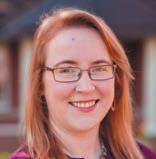
140 alumni attending four Loughburians Go Live Virtual Talks
alumni choosing to remember their school with a gift in their Will
1,453 alumni connecting on Loughburians Live
alumni gave £44,908 to help pupils facing financial hardship
18,000 alumni in our global community







5,587 copies of Beyond the Barrier landing on doorsteps
alumni gave £47,120 to create bursaries and help bright pupils achieve their full potential
6,428 people reading alumni e-news every month











TWENTY TWO bursary recipients joined our schools in Autumn 2021
46 alumni volunteering careers advice in our schools
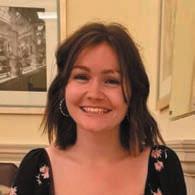




 (Class of 2018)
(Class of 2018)




Ihad known all through my time at Loughborough High School that the archive room existed... but never really gave much thought as to what was in there. Rather, it was just a mysterious room across from Matron’s that was hardly ever used. It wasn’t until halfway through the third year of my history degree, having already completed a project in the Grammar School archives a few years previously, that I actually thought about the potential that the LHS Archive could hold.
Throughout my time at university, I have gradually realised the importance that archives have not only for historians, but also for the wider public. And with this increasing knowledge, the idea of what career I wanted to have started to form - the world of archives, museums and galleries became increasingly alluring. With this in mind, I got in contact with LHS to see if I would be able to volunteer in the High School archive room and asked if I would be allowed to organise and catalogue its collection. Luckily, they welcomed me with enthusiasm.
Initially, I didn’t quite realise the size of the archive that we had until I started to pull apart and organise its contents to see what was in the collection. As it stands, the archive consists of eight cupboards and a bureau, all full of objects and documents; some photographs on the wall as well as objects and photos around the school. Indeed, many items you see around the school are unwittingly part of the LHS Archive or will be in the future.
I started with the cupboards. Everything came out and was separated into different categories, thinking about how the archive would best be used and how one might use it for research. This took some considerable time, and the room inevitably became completely unrecognisable from the tidy interview room that many
know it as. Then I began to sort through each box and organise it as I felt appropriate. Each box was organised dependent on the type of material it contained, eg. alphabetised, organised by event or by date etc. Each item was recorded on a spreadsheet which effectively become an embryo of the catalogue of the archive and will be used in the future to find items as well as keep a log of its contents.
The collections have yielded so many interesting and enlightening treasures about both the history of the school as well as a broader history of the last 170 years of women and education. Some of my favourite finds include the letters from girls and their parents, whilst they were at school and afterwards, to their respective Headmistress along with her replies. These reveal the life of pupils both during their time at school and afterwards as they attempted to make their way in the world. Those from Miss Bristol’s era (she was Head in the ‘20s and ‘30s) reflect how much smaller the School was 100 years ago and the extraordinarily close relationship between the Headmistress and her girls.
I found letters belonging to my own great-great-aunt Doris Hill, who attended the school between 1917-1924, a lovely find as it was essentially a piece of my own history and a long-term personal connection to the School. Another exciting find was a collection of letters from the 1930s that were discovered under the library floorboards in 1996 when the old boarding dormitory was converted into what is now the Cope Library. You can just imagine letters scribbled after lights-out and deposited in a secret hiding place – and ultimately forgotten!
The sort enabled all our copies of The High School Magazine to be reunited. Finding the very earliest copies was a particular thrill. The School magazine was begun
in 1921 and ended its run in 2005. It was created and edited by girls and staff together and contained varying articles on the life of the school as well as creative work from the girls. We don’t quite have a full set – see below on how you might be able to contribute here.
Now a question you may have is ‘why on earth would anyone want to organise and catalogue the LHS Archive?’
This summer, I graduated from Royal Holloway, University of London with a history degree and a considerable interest in heritage, archives and museums. I am particularly interested in 19th century and Victorian social history and art and gender history. This year finds me studying at the University of York on a Masters in History of Art, aiming to widen my knowledge and specialism. I particularly aspire to work in the V&A, Historic Royal Palaces, Chatsworth and National Trust properties. Therefore my work in the archive is not completely altruistic. For one thing, I get permission to do something I am passionate about; for another, I benefit from the genuine experience of archiving and cataloguing, the creation and management of heritage projects and hopefully as a result, the research, organisation and carrying out of public talks. What it certainly allows me to do is to give back to the School I was privileged to attend and enjoy for seven years. I am delighted that I have skills and enthusiasm that have been welcomed by School and can be used to contribute to the continuation and preservation of its history.
So, what next for the archive? Hours, days and weeks may already have been invested in its organisation, but the work needed to fully realise its potential is still only in its infancy. But it is very nearly at a stage where we







can invite in those alumni who have volunteered to help with specific sorts. A few stages on, we will then be able to use the archive effectively for research projects and I would like to be able to use the resources to deliver public talks. But perhaps most significantly, we would like the archive to become a valuable resource, loved and respected by staff and students alike. There is certainly scope for projects for girls to become involved in at various levels of the school and expertise, and use their achievements in the archive towards internal and external recognition of volunteering and service. Already a student has completed the required volunteering hours this summer helping out to count towards a Duke of Edinburgh’s award. The ultimate aspiration is, of course, digitisation – an online resource to match that of the LGS Archive.
Of course, anyone with an interest in an archive knows that what is happening now becomes tomorrow’s history. I hope to help the School not just to preserve what we already have but to continue the growth of the archive, adding appropriate contemporary items to the collection as part of a plan and routine. This responsibility falls not just on a singular archivist, of course, but on a commitment from the whole school community.
I believe strongly that the LHS Archive is something to be valued, respected and enjoyed by all members of the Burton bubble, both past, present and future. I would encourage all those who feel that they have something to contribute to get in touch with the Development Office (contact Olivia Smith at o.smith@ lsf.org) and also to join the dedicated group on Loughburians Live (www.loughburians.com).




Sunny Shah attended Fairfield (1993) and Loughborough Grammar School (2000) and went on to pursue a successful career in investment banking with Citi Global Investment Bank and Goldman Sachs. Earlier this year he started his own venture and joined the Loughborough Schools Foundation Board of Governors to give back and help prepare the next generation for the future. Here Sunny shares what Loughborough means to him and his advice for current pupils and alumni looking to give back and get involved with the schools today.


I have good memories of Fairfield and LGS and owe a lot to the schools for shaping my career today. I’ll always remember my A Level maths teacher suggesting I should avoid pursuing A Level Further Maths, however my father encouraged me not to give up and to prove them wrong. This theme of grit and resilience stayed with me throughout.

Over the Summer I came back to the school for the first time in years and fell in love with the new Music Hall for children to express their artistic and cultural creativity. It was nostalgic remembering friends and games we used to play in the Quad and on the sports fields. Some of my closest friends today are boys from Fairfield and LGS and we remain in touch, attended each others’ weddings and our children all play together today. During school I played chess and was on the rugby, hockey and tennis teams. These days I play golf and squash.
Growing up in the Loughborough countryside, I was always keen to experience the City. Most people I knew were into Medicine, Dentistry, Law or Engineering. But I grew up around business and my heart was always in business. I went on to study Business, Maths and Statistics at the London School of Economics and found my love for a career in finance. Following graduation I joined Citi Global Investment Bank as a summer intern in 2003.
I joined when banking was at the start of the Chinese industrialisation and the broader growth in emerging markets. Then the Chinese industrialisation meant there was a huge boom in commodities, and metals and mining and I was involved in some of the world’s largest M&A transactions and capital raising transactions - a fantastic and surreal experience for someone so young. I went on to join Goldman Sachs where I spent 10 years, was promoted to Managing Director and was most recently Head of EMEA Metals and Mining Investment Banking team before I left in 2021. I am now working on some entrepreneurial projects focusing on the minerals supply chain that are critical for de-carbonisation
technologies.
I chose to get involved as a Governor because of my four-year old son and our daughter who was born in May during lockdown. I benefited from my early education and I want to give something back to the next generation. For my kids, it’s a good thing to teach them altruistic values, giving back and inspiring other people. But also, as I spend time with my children, I can see education is going through an evolution right now. It was different when I was at school. Now everyone has access to the internet and the answers to every question within two seconds. It means that education will no doubt have to adapt to the digital age. I want to pass on my resilience mentality and teach my children to try new things. It doesn’t matter if you don’t get it right the first or second time. If there’s anything I want to teach my kids it’s that, and of course to find their passion in whatever they choose to pursue. We’re at a period where technology and innovation are going to change so many industries. We can’t possibly predict what jobs children are going to be in in 20 years’ time. Everything could be digitalised and automated. To prepare them for the future they will need to think differently and collaboratively. I want to understand how schools in general, and my old schools, can think about preparing children for that future.
If I had to give one piece of advice to pupils today, I would say believe in yourself. Whatever you think you want to do, just keep trying. As my father always told me, if you follow what you want to do with diligence and passion you will get there.
If you are thinking about getting involved in the alumni community today my advice would be just do it. I understand everyone has different schedules, especially with families and young kids, and it can be challenging, but in the end it’s the future generations that are going to drive us forward. It’s our children and the people they’re surrounded by who are going to make the world a better place.
Established in the 1990s, the Masterclass programme provides promising local primary school children from across Loughborough and the surrounding areas with free Saturday morning sessions focussing on Science, Maths, Languages and English.
Around a hundred children gather excitedly, and nervously, on campus to explore new realms of a subject they love in an inspiring setting, taught, guided and nurtured by our expert teachers, who generously give their time to impart learning to all.
LGS alum Robert Saunt began volunteering at the Masterclasses while he was still at school – and simply hasn’t stopped. He is there to help muster children, reassure parents and assist staff, to dole out the much coveted (and now world famous) LSF cookies and to wipe tables, every single session. Robert has quite literally called in from a hospital bed to apologise for any sessions missed – the excuse evident from his location!
As part of the Masterclass team of staff, I am also there near on every session and have been struck by Robert’s unquestioning dedication to both the Masterclasses and School. Since joining the Development Office in January 2020, I have been able to see that his volunteering goes much further, however. Robert will respond to every ‘ask’ that the School makes of him, over recent weeks also attending the Careers Dinner and delivering an assembly about apprenticeships. With never enough time to properly chat when we are knee-deep in primary age scientists and mathematicians, I invited Robert into school for lunch to ask him that key question: Why do you give so freely and generously of your time for our Schools?
Robert said, “I attended the Masterclasses as a child from my primary school in Rothley and was immediately struck by the opportunities at LGS. After experiencing the sessions, I knew that this was where I wanted to go to secondary school. But I also realised that this was a school where you needed to pay fees to attend, and there was simply not the financial capacity at home to make it possible.”
Undeterred, 10-year old Robert arrived home after a Masterclass session and scoured the internet for Bursary forms, printed them off and set about completing them as far as he could before presenting them to his mother with one request – can we see if it is possible for me to attend LGS? It turned out it was, and Robert obtained a full Bursary.
“Attending LGS changed the course of my life. I am incredibly thankful that someone provided the best part of £100,000 and gave me the opportunity to benefit from an incredible educational experience with LGS.”
The answer to my question then is obvious, he says. Robert wants to give back to the School in any way he can, but particularly to the Masterclasses which set him on his LGS path. And for how long will he continue to be part of the team? He says he will turn up indefinitely whilst they remain true to their original spirit, which impacted him so strongly when he
first attended – outstanding teachers sharing their love for a subject for no other reason than their dedication to imparting learning to all.
Robert’s gratitude and altruistic approach hasn’t simply been evident as an alum - he quietly admitted to being awarded the John Storer Award for Service to the School at the end of Year 11. Walking Robert around school during a weekday lunchtime, encountering numerous staff, was an extraordinary experience – it took us quite some time to get anywhere because so many teachers wanted to say hello! And not just hello – everyone was absolutely delighted to see him; I have never witnessed anything quite like it. The warmth and affection staff showed towards Robert was incredible. Why? Many reasons I expect but as one member of staff explained, “Having Robert in school was like having an extra member of staff.” His commitment and contribution to the school then and now is recognised, appreciated and still celebrated.
Robert’s pathway through the school was not without challenges and his Sixth Form route was not typical, repeating Year 12 and then progressing on to an apprenticeship with Mattioli Woods, a wealth management and employee benefits provider. Robert relates being fully supported and guided in making his choices by the School. He doesn’t quite appreciate it, but his decision to follow an apprenticeship makes him something of a pioneer, being one of the first students to take this post-school route and paving the way for others to be brave enough to follow. It’s reassuring to know that he will always be there to offer them encouragement and advice if they need it.

Robert is nearing the end of his degree apprenticeship programme at the same time as working as a Business Analyst, looking at process and systems improvement, integrating acquisitions and operational efficiency. He is a very modest young man, aware that his pathway post LGS is not a traditional one but not fully aware of the unique and highly desirable skill set he has acquired and the personal qualities he possesses. Robert is ready, as always, to consider and then apply himself 100% to any opportunities that present themselves and hopes to set up his own business in the near future; he has plenty of ideas about this already. I have complete faith that he will achieve all he puts his mind to but be able to flex and adapt to challenges that he will inevitably encounter in all aspects of life and business.
As Robert says, “Everyone is on their own journey – and I am truly thankful and appreciative that LGS formed part of mine.”
By Olivia Smith, Alumni Engagement Officer












Our alumni give back to our Schools in a plethora of ways and this page is dedicated to highlighting your amazing contributions. Thank you for giving your time, talent and expertise to support today’s pupils and make a difference to our Schools. The generosity of our alumni never fails to astound us – Thank you!
Here are some examples of how alumni are contributing to the Schools today:



Cyril Engmann (Class of 1987) spoke at our 100th Burton Service. He made a huge impact on the staff and students as our guest speaker.
Lieutenant Colonel Adam Foden DSO MBE (Class of 1996) returned to School in July to inspect the contingent as the Reviewing Officer of the Combined Cadet Force’s 63rd Annual Review.

The Music Department valued the assistance of Ellie Slorach (Class of 2012) who ran a Symphony Orchestra Workshop and Ailsa Burns (Class of 2019) who made tutorial films for the Y2 strings scheme to allow lockdown learning.
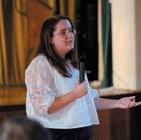
Our Black Alumni Group are continuing to work closely with Dr Fiona Miles. Thank you to all who have contributed, including Kash Palmer (Class of 2013), Jualani Palmer (Class of 2017), Seun Matiluko (Class of 2015) and Chanju Mwanza (Class of 2012) who have led the way with a new initiative at LHS called ‘Proud to be…’ The Development Office are hugely indebted to the efforts of Dave Barnett (Class of 1977) who coordinates the Loughburians Golf Society. You can read more about the Golf Society on page 54.
The Careers departments have run several events, both virtual and in person and our alumni community have been so generous with their time. Becky Simms (Class of 2013), Sarah Kelly (Class of 2005), Jualani Palmer (Class of 2017), Katie Morris (Class of 1999), Lydia Forster (Class of 2009), Tessa Boyd (Class of 2014) and Emily Daniell (Class of 2007) all delivered careers talks for LHS pupils over the lockdown learning period.
Firaz Waez (Class of 2001) got back in touch with the Schools on his return to the Loughborough area and gave a fascinating careers talks about the music industry.
Phillippa O’Neill (Class of 1991) offered networking assistance to a fellow LHS graduate.
When LGS were organising their Careers Dinner, we put out a call to arms for assistance in multiple industry areas. Aaron Anstey (Class of 1995), Ed Wheatley (Class of 1991), Emma Wardle (Class of 1991), James Hutchinson (Class of 2014), James Taylor (Class of 1994), Peter Cannon (Class of 1980), Ricky Ruparelia (Class of 2009), Robert Saunt (Class of 2018), Sam Wilkinson (Class of 2006), Shameet Thakkar (Class of 2006), Tom Bird (Class of 1994), Tom Fanthorpe (Class of 1999) and Tom Owen (Class of 2007) all attended to represent their individual industry sectors. In addition, we had offers of help from the following alumni who remain on the careers department radar for future years:
Arjan Giga (Class of 1997), Ethan Youel (Class of 2014), Stephen Bott (Class of 2005), Michael Smith (Class of 1987), Chris Ninan (Class of 2002), Mairi MacLean (Class of 1984), David Watson (Class of 1999), Rachel Healey (Class of 1999), Rajvinder Saundh (Class of 2002) and Louisa Sanfey (Class of 2000).
Sometimes alumni are asked if they would consider coming back to School to lead assemblies or other special events. Robert Saunt (Class of 2018) presented an assembly on apprenticeships as a post-18 option. Niraj Nain (Class of 2000) led a session with our computer science students about careers and internships in programming. Alex Eveson (Class of 2020), Gurbaksh Sandhu (Class of 2019), Ethan Stratford (Class of 2017) and Jake Walton (Class of 2018) contributed to the leaving assembly for outgoing Headmaster Duncan Byrne. Lauren Church (Class of 2016) was a fantastic contributor to the LHS Space Day inspiring all in attendance. During lockdown we hosted several Loughburians Go Live talks for alumni and are extremely grateful to Matt Bull (Class of 1998) and John Weitzel (LGS Staff 1978 – 2016) who entertained us on a variety of subjects. Jack Nunn (Class of 2004) and Ross Burns
(Class of 2015) have both volunteered their time to present future talks. Mansi Vithlani (Class of 2019) and Diya Kalyan (Class of 2019) both spoke at the Life after LHS day and Giles Kristian (Class of 1994) inspired Year 6 pupils with his experiences of being an author.
QuadFest was a huge success as a celebration of our recent leavers and their achievements. Caitlyn Byrne (Class of 2020), Alex Eveson (Class of 2020), Sarah-Jane Feeley (Class of 2020), Libby Mallon (Class of 2020), Elicia Pancholi-Moore (Class of 2020), Finley Parsons (Class of 2021) and Naomi Wilbram (Class of 2020) were all a huge
help with recruiting guests or creating the decorations for the evening. Shailan Mehta (Class of 2007) and his band provided the entertainment and Emilia Foot (Class of 2020) wowed us with her amazing singing voice. Thank you all.
When the Classics department were looking for a way to inspire our current Classicists, the following alumni all contributed to a Where my Classics Degree took me… piece: Verity Simpson (Class of 2005), Kate Gray (Class of 2010), Fay Collinson (Class of 2006), Rachel Emmerson (Class of 1978), and Elizabeth Lewin (Class of 2001) all spoke so glowingly of the teaching they received in this area.
This year we launched the Completion Fund in response to the three-fold increase in families experiencing financial hardship who were unable to meet the cost of school fees due to pandemic. Collectively, to date, 122 alumni raised £44,908 enabling 25 pupils to continue their education and ensure that no pupil got left behind. We are delighted to celebrate all who gave on our Donor Roll of Honour:
• Edem Ankutse (LHS Class of 1997)
• Ian Antill (LGS Class of 1971)
• Michael Aris (LGS Class of 1952)
• Ronald Atkin (LGS Class of 1963)
• John Birch (LGS Class of 1959)
• Don Bird (LGS Class of 1943)
• Tom Bird (LGS Class of 1994)
• David Brockhurst (LGS Class of 1950)
• John Br yson (LGS Class of 1974)
• CMS Cepcor

• Romaine Darey (LHS Class of 1987)
• Joan Davis - née Hancock (LHS Class of 1953)
• Gar y Deurance (LGS Class of 1976)
• Tom Drife (LGS Class of 1994)
• Stephen Drott (LGS Class of 1997)
• Tony Eley (LGS Class of 1953)
• Peter Frewer (LGS Class of 1966)
• Janet Frost - née Smith (LHS Class of 1959)
• John Futcher (LGS Class of 1965)
• Laurence Gormley (LGS Class of 1972)
• Elaine Hare (LHS Class of 1954)
• Gillian Hayward - née Smith (LHS Class of 1959)
• Michael Hendr y (LGS Class of 1967)
• Andrew Hill (LGS Class of 1964)
• Helen Hood - née Lesser (LHS Class of 1957)
• Ed Hopper (LGS Class of 1994)
• John Hubert Lacey (LGS Class of 1963)
• Carol Laidler - née Lloyd (LHS Class of 1975)
• Steven Xiaochen Li (LGS Class of 2003)
• Katherine Morris - née Sprake (LHS Class of 1987)
• Joseph Murphy (LGS Class of 1997)
• Michael Napier (LGS Class of 1964)
• John Neal (LGS Class of 1966)
• Gillian Neal - née Mee (LHS Class of 1974)
• Tom Owen (LGS Class of 2007)
• Vina Parekh - née Patel (LHS Class of 1986)
• Mitul Patel (LGS Class of 2003)
• Jacqueline Prescott - née Kirk (LHS Class of 1970)
• Sandra Prince - née Ellis (LHS Class of 1972)
• Ajay Ratan (LGS Class of 2009)
• Lisa Ratcliffe (LHS Class of 1987)
• Laura-Jane Ryves (Current Staff)
• Tim Seager (LGS Class of 1982)
• Peter and Chris Sergeant (Former Staff)
• Elizabeth Sydenham (Former Parent)
• Fiona Sydenham (LHS Class of 1992)
• Lawrence Taylor (LGS Class of 2012)
• Dr David Taylor (LGS Class of 1963)
• Pauline Taylor (LHS Class of 1972)
• Kate Thurman (LHS Class of 1973)
• Steve Tilsley (LGS Class of 1967)
• Harris Tisarhontou (LGS Class of 1997)
• Philip Tranter (LGS Class of 1977)
• Ian Walker (LGS Class of 1948)
• Douglas Ian Watson-Walker (LGS Class of 1963)
• James Webster (LGS Class of 1954)
• Robert Wix (LGS Class of 1985)
• Catherine Woodbine (LHS Class of 1977)
• Jennifer Wyles - née Leach (LHS Class of 2005)
• Jason Young (LGS Class of 1989)
Thank you to those 63 donors who chose to remain anonymous. If you would like to be recognised in the future, please do get in touch with us.
Many alumni choose to support the Schools in other ways. Some contribute to our Burton Bursaries Fund, helping to make a Loughborough Schools’ education accessible to young people. Together we raised £47,120 and helped enable 120 children to access a Loughborough Schools Foundation education. Other alumni have chosen to remember their former School in their Will as part of the Thomas Burton Society. If you would like to become a donor, please do get in touch –development@lsf.org or 01509 638920.
Since September 2018 the Loughborough Schools Foundation has provided fee assistance to 296 pupils. In 2020/21 alone, 184 pupils benefitted from fee assistance. But how does a bursary come to fruition?

The process from first enquiry to first day at one of our Schools can often be a journey of more than a year. We went behind the scenes to find out what happens – from initial outreach to the lived experience of a bursary pupil - and to meet some of the people that make a Loughborough Schools Foundation bursary a reality.
In most cases, it starts with outreach. Sam Lister, Registrar at Loughborough Grammar School explains. “My role is to develop links with local primary schools and the community at large to raise aspirations, expand engagement and increase awareness in the kinds of opportunities that Loughborough Grammar School can provide.”
Programmes that the Schools run
help to create strong relationships between Loughborough Grammar School, Loughborough High School, Loughborough Amherst School, Fairfield Prep School and participating local schools and pupils. These include summer schools and masterclasses that enable local children to discover new subjects, talents and interests through interactive activities and workshops delivered by our teachers and sixth formers.
Sam sees the consequences of these programmes every day. “Once we start to develop relationships and engage through these initiatives, we are able to generate more enquiries for bursaries from the schools we are involved with.” And although it takes a lot of work, she
“For many families we are their first experience of an independent school. I want them to feel welcome.”
Alison Anderson
says, “It’s all worth it when the boys arrive here in school and discover an extraordinary range of opportunities to develop their passions and skills, so that they get to know themselves and acquire the emotional intelligence needed to thrive.”
At Loughborough High School, Alison Anderson is there as Registrar to take girls through the applicant journey and is one of the first people that a potential bursary candidate will meet. “Warmth is an essential characteristic for the role,” she says. “Some people may have a preconceived idea about the School, and for many families we are their first experience of an independent school; I want them to feel welcome. The School buildings are large and imposing, and you don’t get to see much beyond that in the first instance – so it’s important that we can give people a sense of who we are.”
Once Alison has an application registered, she’ll pass it on for financial assessment, and then steps in again to help organise the assessment process and entrance exam. She’ll hold the candidates’ hands until they are in the school, helping with their uniform, transport issues and anything else that’s needed.

Each school has its own approach to bursaries. Dr Christopher Barnett, Head of Loughborough Grammar School,
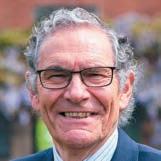
describes a process which demands very individual attention from the Head to secure the best and most deserving candidates. He estimates that as many as 50% of applications to the school will be for bursaries at some level. After a highly personalised process he will make offers for the seven places that, on average, he has available every year.
“Loughborough Grammar School has a transformative impact on boys’ lives. Everywhere you look, you discover a school bursting with activity, where boys have huge respect for the varied talents of their peers and learn as much outside the classroom as within. Bursaries enable us to provide the highest quality education and a world of opportunities to those whose families wouldn’t otherwise have the means to access it.”
“Tom joined us from a small primary school in Year 7 and grew in confidence and capability, inspired by his teachers and supported by friends. He got involved in all aspects of the School; from playing the trumpet in Big Band to joining the RAF section in the Combined Cadet Force. Here, Tom experienced RAF camps, leadership courses, fundraising, flying planes and shooting. He set himself a goal to become an RAF Officer and I am absolutely delighted to see Tom has realised his ambitions and become a pilot in the RAF.”
Dr Fiona Miles, Head of Loughborough High School, is a Head who likes to be involved from the first open event right through the process. She is passionate about bursaries, but mindful, too, that it’s crucial to make sure the awards go to the right pupils - and she sees her active involvement as vital in this. She is also very clear that a bursary is about more than a girl joining the school; that it’s about the whole family joining the LHS community, and establishing strong, mutually supportive relationships.
“It is important that they really want to come to the School and are as invested emotionally in us as we are in them. One of our sixth formers said to me recently that LHS are creating the young women
that the future needs. Looking up, our Year 7 pupils see in the older girls their leaders, their role models and their future selves. They see no limits on female aspiration as they watch our Year 13s go on to become astrophysicists, architects, actors and artists, and they benefit from an inspiring and culturally diverse network of alumni who regularly return to share their wisdom as women in the world of work and entrepreneurship”
Dr Julian Murphy, Head at Loughborough Amherst School (formerly known as Our Lady’s Convent School) describes a caring ethos routed in a core Catholic belief about respect and love for each individual. His school aims to encourage and challenge every pupil to become the very best version of themselves by helping parents nurture confident, compassionate and happy young people.
“Two of our recent bursary recipients went on to the University of Oxford and Imperial College. During their time with us, both students took full advantage of opportunities such as the Extended Project Qualification, Debating Society and one-on-one university admissions coaching, and both in turn contributed much to our diverse community.”
“Looking up, our Year 7 pupils see in the older girls their leaders, their role models and their future selves.”
Dr Fiona Miles
Our bursaries change lives. By donating you will be helping bright pupils achieve their full potential. Every gift makes a difference. To give, call 01509 638922 ext: 5301 or email L.ryves@lsf.org
In 2020/21, Loughborough Schools Foundation distributed £1.3M in bursaries and fee assisted places and, at any time, some 180 pupils are receiving a bursary or financial assistance. More than this, though, the Loughborough Schools Foundation is gearing up for a major fundraising stepchange, with the launch of a new bursary campaign to double the number of places and change even more lives by 2030.
“Bursaries are lifechanging helping our boys to achieve their ambitions”
Dr Christopher Barnett

Rev’d Elizabeth York began working as the first Chaplain to the whole Foundation in September 2019, (previously Chaplains were only ever appointed to LGS). Elizabeth is an alum of LHS and is married to Chris (Class of 1988). She has three children – one an LGS alum (Class of 2019) and two who currently attend LAS.
Whether it’s favourite teachers and lessons, trips, sports days, Burton services, the May Ball or LES musicals, I have many memories of LHS/LES.
I joined LHS in the Lower Fifth and I’m grateful that I was able to make friends and feel as though I belonged to the school so quickly - this was especially true in the Music Department. Music was always an important part of my life at LHS, as both an academic subject and as something I enjoyed through extra-curricular ensembles; it has remained important to me beyond the barrier and now one of the great privileges I have as Chaplain is supporting LSF’s young musicians by attending Soundbites, Lunchtime Live and other school concerts.
Having joined LHS so late, I was surprised to be chosen to be Head Girl - a role that often took me out of my comfort zone. I can still remember the nerves before I had to speak at Prize Giving! I would never have put myself forward for this role, but I know now that it was a great opportunity to learn about service and gain valuable leadership skills. During the past couple of years as Chaplain, I can see that giving our pupils opportunities to lead continues to be an important part of the offering made by all our Schools, whether this comes through being a form captain, by running a society or by captaining a sports team.
I left school to study French and German at the University of Birmingham but decided at the end of the first year that it wasn’t for me. It took me a long time to integrate this false start in a positive way: at the time, I remember feeling as though I had fallen short of where I wanted to be. I took a year out and worked in various retail jobs and banking, all of which gave me the chance to learn about myself and the world outside the privileged contexts of home, LHS and University.
At the end of the year, I began another
degree studying Music at the University of Nottingham. After a short period exploring orchestral management, I found my way into full-time teaching –firstly as a peripatetic music teacher in inner city Nottingham and then, after a PGCE at Nottingham Trent University, as a full-time teacher and Music Coordinator in primary schools.
I added another subject specialism by completing a distance learning diploma in teaching RE and then, years later, when my children were little, my language skills and teaching experience enabled me to begin a new chapter as a teacher of French across the primary school phases. This in turn led to some valuable experience teaching in KS3 and the realisation that the year of study in Birmingham had led to something positive.
By this time, I was aware of being nudged in a different vocational direction, but I continued to teach for a few more years until I found the courage to respond to a sense of calling to full-time ministry. It took me around a decade to let go of teaching, which was a career I loved, and commit to the discernment process that led to me being selected for training for ordination in the Church of England.
This change of direction meant a further two years of full-time, postgraduate study, before I was ordained and served four years of training for ministry in local parishes. During this time I completed courses in Chaplaincy Skills and Counselling before being appointed as LSF Chaplain in 2019.
Looking back to write this account has reminded me how much happened in those early years after leaving school and how unexpected much of this was. I had always assumed that learning and life would follow a linear pattern after school but, in fact, the journey to now has been a lot richer, more creative, chaotic and challenging than I could ever have planned. This feels like an
important, hope-filled story for the Chaplain to tell whenever invited: life can be fuller and more exciting than we might imagine for ourselves!
Whilst at theological college I came across a quote by the Danish philosopher and theologian, Soren Kierkegaard, who said that ‘life can only be understood backwards but must be lived forwards’. I like to think it’s possible to live life forwards with understanding too, with the help of the gift of faith, trusting in God who loves all his creation and desires to give each of us ‘hope and a future’ (Jeremiah 29:11-13).
With a lot of life lived since those first steps beyond the barrier, I know I have re-joined the LSF family with a deeper personal understanding of the ‘blessings’ and ‘unfailing mercies’ we sing of in the school hymn.
As Chaplain, it is a privilege to be able to represent the faith, tradition and hope on which the Schools are founded and help current generations begin and continue to live their own, unique and hope-filled stories.
Since the first lockdown, the Music Department have been sharing many of their musical treats, both weekly occurrences such as Sound Bites and Lunchtime Live as well as concerts for special occasions with us via their YouTube channel. Even though inperson attendance is now possible, they continue to post recordings and these are available to all at https://www.youtube.com/channel/ UCb7x4StW96miQ2ScK1Zs5QA

In our careers section, we invite alumni to give us an insight into their career and life journeys since leaving their School. We are grateful to Rich, Lora and Alex for sharing their stories.
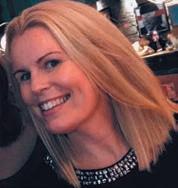
Ijoined Our Lady’s Convent School in 1983 at four years old. I left after completing my A levels in 1997. The school was my constant and leaving was a hard transition as I had never known anything different.

As part of my Head Girl’s speech at Prize Giving, I focused on the fact that OLCS was about creating rounded individuals with good morals who had achieved academically to the best of their ability. I was not a high achiever - I did well in my GCSEs and found A levels hard. What I did not realise at the time was that the moral and spiritual education that I had received would influence my career path.
Transition from my safe place, my school to university, was confusing and scary. I did not know what I wanted to do at all after school, just that I did want to do a degree. I was given some advice and told to do something that I enjoyed. I had always loved history and so I opted for that. I liked it so much that I went on to complete my Masters as well. I spent four amazing years at university and met my husband aged 21.
We wanted to settle down and get on the property ladder, so it was time for me to look for employment. I saw a short-term contract advertised at the University of Sunderland working within student welfare administration. I took the role and ended up working within the department for five years. Next, I applied for a role at a local Further Education College, again in student welfare, this time gaining experience of working with under 18s. I was always willing to take on new challenges, expand my learning and push myself out of my comfort zone. During my 12 years at the College, I became Designated Safeguarding Lead and worked my
way up to the role of Assistant Principal managing a large student welfare department.




In 2018 my husband asked me when I had last interviewed for a job. I realised that it had been over a decade and that I needed to ensure that I could perform in a competitive environment. I started to look in The Guardian for national positions that would suit my experience, where I saw a role advertised for Head of Safeguarding for The English Football League. It appealed to me as I wanted to use my skills from education in a new industry. After two nerve wracking interviews, I was offered the job and we relocated to the Northwest of England three years ago.
I love working with such a wide range of organisations. We have 72 football clubs across England and Wales, making up the Championship, League One and League Two of Professional football. I work closely with other key stakeholders in the industry, the FA and the Premier League and travel around the country ensuring that Clubs meet the safeguarding standards we set.
Working in safeguarding is a privilege but does have an impact on you as an individual. You need to have a strong conviction and passion to do this type of role. My motivation is to ensure that children, young people and adults at risk are not only safe from harm but that they can thrive in whatever activity or environment they are in, reaching their potential and becoming well rounded individuals with good social skills and morals. I feel as though I have come full circle - how I described the School’s ethos at the Prize Giving as Head Girl is now my vocation and I look back at my school years with nothing but gratitude and happy memories.


 (Class of 1997)
(Class of 1997)
Iremember vividly the first conversation I ever had about a career beyond Burton Walks at the age of 14. My mum was driving me to school and she asked the age-old question: “What do you want to be when you grow up?” I said that I enjoyed writing so mum proposed either a journalist or a politician. I said that I didn’t like lying so probably a journalist then, clearly blissfully unaware of the media’s track record for also telling fibs. But from that point on I felt like I finally had something to aim for.
A mere 28 years later I am now sat at my computer, desperately trying to cobble together a story of what can only be described as a patchwork quilt of roles in different industries and disciplines, mostly in the media. The one thing that is consistent is that without self-belief, I know I wouldn’t have had half the experiences or taken half the risks that have led me to where I am now. I know for a fact that this self-belief came from my time at LGS. With a newly-found purpose I set about working towards a media career through multiple work experience visits to the Loughborough Echo, Leicester Mercury, Oak FM and Radio Leicester. This experience combined with my modest A-level grades led to a place at the University of Central Lancashire where I did a BA (hons) in Journalism, followed by a Masters in Online Journalism. Probably the most memorable, if not sobering, experience there was covering the Harold Shipman trial, which was held at Preston Crown Court. While completing my Masters, I had already started working at a new website called Rugby.com as their Rugby Union Editor. As a life-long rugby fan this was a dream come true. By day I was writing news stories about rugby and in the evenings, I was interviewing the likes of Jonny Wilkinson, Austin Healey and Richard Hill.
But, like most websites without a solid business plan in the early 2000s, the dot.com bubble burst and the business collapsed. I used this opportunity to do some travelling and when I came back a few months later, I was desperate to get back into writing. This took me down a completely different path working for a corporate communications agency in Leamington Spa.



Having experienced writing about something I really cared about, I did question whether I could summon the same passion when asked to write about supermarkets, fast food chains and security companies for internal staff magazines. I certainly struggled at first, but I remember my editor explaining that, in anything you do, you “just need to find the love for it”. So, I did. I realised that writing is about the audience, not about me, and really started to enjoy meeting and working with so many employees from so many different walks of life. In total I was with the agency for seven years (with a year out to scratch the itch of running a chalet for a ski season) and during that time I got to play football with national sports journalists in front of Sven-Göran Eriksson, attend the Labour Party Conference in Brighton with G4S, cover the McDonald’s annual conference in Barcelona, shake hands with Geoff Hurst, while holding the FIFA World Cup and, most importantly, build life-long friendships with some amazing and gifted writers.

My next step was working in-house as a Communications Executive for logistics company TNT, before moving on to a role as Internal Communications Manager at Lloyds Pharmacy. It was here that I was tasked with telling the story of the 16,000 staff working across the 1,600 pharmacies in the UK, which was a humbling experience. I was also given free rein to be a little less corporate, arranging for all staff to get involved in a world record attempt (the largest number of simultaneous blood pressure tests) as well as convince the CEO to swim with sharks on video to highlight the impact stress can have on blood pressure! From here I learnt that corporate doesn’t have to mean boring.
After a brief stint contracting at E.On, I moved to become Head of Internal Communications, and then overall Head of Communications, at Aggregate Industries. This was a company that essentially took rocks out of the ground and turned them into different building products. Yet again, I was challenged to “find the love”. It didn’t take long as it was our materials that built much of the 2012 Olympic Park and the concrete core for The Shard. My boss at the time told me it was very rare to work somewhere that makes something that pretty much everyone in the UK will come into contact with on
 With Marty Jopson from The One Show at Glensanda.
With Marty Jopson from The One Show at Glensanda.
a daily basis. Be that roads, buildings, train track ballast, flood defences etc.



One highlight there was arranging for the BBC’s The One Show to pay a visit to the biggest granite quarry in Europe called Glensanda in the highlands of Scotland. We were essentially quarrying the inside of a mountain peninsular, with all material taken away on enormous self-loading cargo ships and they wanted to film the operation. However, after five years I was looking for a new challenge and one came up that I just couldn’t turn down.
In 2017 I joined Rolls-Royce Submarines, heading up their internal, external and crisis comms function. The business designs, builds and maintains the nuclear propulsion systems that power the Royal Navy’s fleet of nuclear submarines – seven attack submarines and the four ballistics boats that maintain the UK’s continuous at sea nuclear deterrent.



The opportunity to work for a prestigious business such as Rolls-Royce was tempting in itself but the chance to join a business with that level of strategic national importance was just too much to turn down. In 2019 I had the opportunity to tour one of the docked Vanguard class boats that hold the Trident missile system and it was an eye-opening experience. For anyone that watched the recent BBC drama Vigil and thought it looked quite claustrophobic, in reality the brave men and women on board these boats, constantly underwater for months at a time, have less than half the space portrayed in the programme. I had an even greater respect for their dedication and duty after that visit.
From the day I joined Rolls-Royce Submarines to the current day, I have never once had to “find the love” for my subject matter. It was evident in the immense



pride and passion that all 3,400 employees exude every day and this truly came to the fore during the COVID-19 pandemic. From the start, the whole workforce were designated key worker status and the business did not miss a beat. Over 50% of the teams were on site every day, manufacturing critical components, maintaining our commitments to the Royal Navy and working to keep the UK safe from other, less publicised, threats. The remaining employees, myself included, were charged with maintaining our own commitments from home – communication naturally being at the forefront of priorities as we all navigated uncertain waters brought about by the virus.
Present day, and, while being first and foremost a Submarines business, we are embarking on new, equally exciting opportunities. We are challenging our uniquely gifted nuclear experts to develop power solutions for use in space, alongside the UK Space Agency, and back on earth through the development of Small Modular and Deployable Reactors, to answer the Government’s call for renewable energy. Every day is something different.
So, while it has been a varied and, at times, frantic career, I really do have a lot to thank both my mum and LGS for when it came to inspiring me, encouraging me and giving me the best possible foundations to believe in myself and those around me.
When I left school, I was all set to follow in my parents’ footsteps as a teacher. Unlike them, I chose primary teaching as I felt more at home with the under 10s as opposed to teens! I went north, to Bradford, a town near my grandparents house so that I was never far away from home cooking or my cousins. Whilst there, I had a placement in a nursery and fell in love with the thought of playing, creating and nurturing the under 5s. So, with my degree in education, I came home and started an NVQ in Childcare at a local nursery. Seven years went very quickly; I completed my NVQ, managed several of the rooms at the nursery and gained my early years professional status.
Not fully satisfied working at a nursery, I hung up the uniform and made my way into nannying, thinking of all the experiences I could get working much more closely with the families. Firstly, I worked as a ‘live-in’, down in Cambridge, then, after meeting someone, I came home and got a job in Leicestershire. Tragedy struck in 2010, when my partner died, but with the loving support of my amazing parents, and a job looking after three amazing children, I was able to carry on.
Nannying brought lots of challenges, from getting an 18 month old adventurous little girl down from a tree, to traipsing around Bradgate or Beacon Hill in the rain, as well as finding activities to keep the three children occupied. I loved nannying. We enjoyed many holidays together and I felt very privileged to be a part of the family. Unfortunately, when my youngest ‘charge ‘ started school, I felt lost. I had grown to love these children as my own as well as becoming good friends with their parents. I still seem them now and they are growing up to be amazing young people. I am hugely proud of them. I went on to look, and subsequently work for, other families, but I never found the right fit. Nannying was changing, as was I. I had always had an urge to start a family, but with health problems as well as unsuitable partners, I wasn’t sure how - until one day when I saw an advert for Leicester City fostering on the side of a bus! I had long chats with my mum about whether I should and remember my dad telling me to have a try. No matter what I wanted in life, my parents always supported me, and I knew they would be behind me in this adventure as well.
After attending an open evening, I was fast tracked through a gruelling process, having to talk about my schooling, finances, family, how I was parented and relationships, as well as my support network and who I could call on in times of need and support. Naturally this position fell to my parents, particularly my mum, Megan,
who had been my rock throughout my life. My mum was fiercely proud of all the barriers I had overcome and knew I was capable of giving vulnerable children a home. I had always wanted to be a mum – this is how it was going to happen.







So, my dad, Mel, scoured the local area for toys and my mum helped me build furniture; friends donated cots, stair-gates, toys and clothes. And then we were sent a date for the approvals panel. Worse than any interview or being called to the Head’s Office as a child, this panel consisted of 14 individuals with differing expertise and responsibility in social services. Mum answered questions as any respectful High School teacher would and presented the panel with an image of a daughter who fights for what is right and hates the word no. A mere ten minutes later, we were invited back in from a side room to be given the resounding thumbs up. I was approved as a foster carer in July 2016 – and then the waiting game began!
Thrown in at the deep end, my first sibling pair (two boys, aged 6 and 4) arrived with the eldest hating school and food being an issue for the youngest who was tiny. The boys were constantly on the go and I was doing it single-handed, although my mum would get nightly calls to ask for advice and my dad would whisk them off for a farm visit or tractor ride. My parents were, and my dad still is, a huge support and the children adored them. As a family we enjoyed trips to Leicester Tigers, Pantos, London and for holidays. They blossomed and their pictures joined those of my parents’ other grandchildren on display. Then, in January 2018, the best thing
Lora with mum Meganhappened – they were adopted.

I remember that week as if it were yesterday –meeting the new parents (who were nervous of course), encouraging and reassuring the children, driving them to their new home. It was my proudest moment, knowing that it was the best thing that could happen to those boys. We are still in touch – the now 11 year-old is at secondary school and his brother still as cheeky as ever with a smile to melt your heart.
My boys settled and starting a new life, Mum and I took some respite in a trip to Egypt for some sun, cocktails and snorkeling! We returned tanned, relaxed and ready for the next challenge.
Then a phone call saying two children, due to be reunited with their mum, needed a few months in care. This time a boy and a girl, I got ready to open my heart and home. They were with me two terms before I was thanked for helping them make the transition back home a happy one.
Next, a single child - a 13 year old girl, who didn’t want to be living at home, who needed a carer as an emergency. I remember explaining to social services that I was not qualified to handle teens, but then who is!? What I did know was that mum and dad had 80 years+ experience of teens between them, so I was confident I could handle a few nights, or a week, with a troubled teen. We went to Alton Towers, we went shopping, to the cinema, to rugby matches, we watched films. This girl just wanted to be accepted and loved. However, a few nights turned into seven weeks, and the teen became dejected with life. My mum then became an advocate for her with social services and spent many an afternoon helping her with her education, her social skills and generally acting as a good ‘Gran’. It really does take a village to raise children. Eventually, she was found a place and moved late August. Another holiday and precious time with my mum and mentor.


In October 2018, after a training event for fostering, a phone call came asking me to place two girls (aged 8 and 10) out of a sibling group of four. Eventually I was asked to consider having the girls until they were 18 as they were not expected to be going home. Mum and dad were onboard again; the youngest fosterling had an amazing
relationship with both my dad and partner; and the new school was working well. So I agreed to become their long term foster mum. It would mean a lot of hard work but it felt doable. This was of course before COVID-19 hit, and my mum’s cancer diagnosis.




Just before COVID-19 hit, the older of the two sisters decided she wanted to live with an older sister, so I now had to prepare them for more change and separation from each other. As the pandemic took grip, life as we knew it changed. I had to be there to support my foster daughter as everything changed - schooling, her safe space, seeing friends, seeing my mum. Then in February 2021, my mum died. I went from caring for a vulnerable child, to also caring for my grieving dad, who still works at LHS. Dad’s support never wanes, however. He loves taking my daughter on bus and tram trips, going for walks and having bonfires in the garden. We have regular pizza parties at his house and we give my foster daughter the experience of family. She is included. She is safe. She is home.
When I left school, I wasn’t an overly high achiever, but I came away with more. Going to Loughborough High School helped me to broaden my networks and I’ve been incredibly lucky to meet some pretty awesome people in my life! I made some amazingly strong High School friendships that have travelled through into adulthood, supported them when needed, like they supported me. The School gave me so many amazing opportunities to grow, be it a trip abroad or reading with Fairfield children, as well as RE lessons with Mrs Needham and Mrs Thirlwell which really inspired me to grow my faith. I spent the last 20 years watching my parents nurture and support hundreds of LHS and LGS students to become who they always wanted to be. My mum was always passionate about that. To be the best you is the best you can do. These influences have meant that I now strive to give children the love, care and opportunities needed to become the best they can be.
This year, I celebrated five years of fostering. The hardest yet most rewarding path I could have taken.
Lora’s dad Mel1921 saw the birth of The High School Magazine. As the Editors, M. Allcock and M Towle, pointed out, ‘a school of the size of ours ought to keep some record of its doings’, although a further motivation seems to have been to make it ‘a keen rival to the Loughburian’ (the boys’ school magazine). Certainly, any school archivist is immensely grateful for the institution of such a magazine as those copies are the single most important historical item for giving those of us looking back an idea of what the School was like and the significant events for its inhabitants. The editors hoped that, through contributions from across the school, the magazine would ‘reveal much genius’ and they particularly appealed for Old Girls to make contributions (as they were included in the distribution list). Note that there was a charge to receive the magazine.
The thoughts of an Old Girl (Isobel Thornley at that stage teaching History at University College London) on the new magazine are printed. She hoped that the creation of this magazine ‘should help to maintain a living tradition of achievement and success which should fire the imagination and ambitions of other generations of Loughburians’. Isobel writes passionately in her encouragement of girls at the school to aim high and grasp the new academic opportunities that now lay before them at the start of the 1920s. After describing her career path through to a Master’s degree and her imminent departure
to take up a position of AssistantProfessor at an American University, she encourages ‘let them be ambitious for these desirable things; they are not so hard to attain’ and advocates a university education as bringing more opportunity than just the previous principle route into school teaching: ‘since the war brought wisdom, employers in almost every business and profession are anxious to secure the services of University women, and the Federation of University Women has developed machinery to supply the demand. The possibilities of the situation are endless.’
The High School Magazine is but one of the many new initiatives Miss Edith Bristol, appointed Head in 1920, was pursuing. The school had ‘advanced towards self-government’ that academic year by instigating prefects and form captains and a new system of marking work implemented with five possible grades: Red A, A, B, C and D. Girls achieving three As in succession were allowed to sign their names in an Honours Book.
In Miss Bristol’s letter to the girls, she appeals for them to ‘stay longer at School’. It seems many were leaving at 14 or 15, but Miss Bristol feared for their job prospects in the economic climate; she felt that the real experience of school life didn’t begin until they became ‘senior girls’ and had the ‘opportunity of representing and serving the School, of giving as well as receiving’
This year saw the acquisition of the first school trophy, the Handley Cup, awarded for ‘gymnastic work’. This was provided by Mrs Allcock (née Handley) who had just become one of ‘three Lady Governors of the School’ and presented to the winners by a Miss Fernyhaugh whose presence in school seemed to cause much excitement. The School hoped to receive more such trophies and encouraged the girls to think of ways of improving their fledgling library, recommending the ‘delightful custom’ of some other schools ‘whereby girls who are leaving present, either individually

or in groups, one or more volumes to the Library’. We have certainly found snippets of evidence in the archive that suggests this initiative did begin and was sustained for some considerable years.


Miss Mary Walmsley, the previous Head, was welcomed to that year’s Speech Day, taking place in the Corn Exchange, in order to distribute the prizes. She was received with cheering from the ‘270 white-robed maidens present’ as she made her thank you speech on receiving a gift.
For many years the Grammar School had celebrated Founder’s Day in memory of Thomas Burton but in 1921, the High School were invited to join this commemoration in a much grander version at the Parish Church. Miss Bristol points out to readers of the magazine that as well as understanding ‘the debt we owe to our Founder’, they should also take the opportunity to remember ‘the unnumbered and perhaps to us unknown folk , men and women, whose devoted service in the past has secured for us the educational and other advantages which make it possible for our life to be so much wider and fuller than that of our grandmothers.”
Buried in the notes of News of Old Girls, but quite rightly highlighted again elsewhere in the magazine, is news of another role model for the girls: Margaret Wintringham (LHS 1897), recently elected as MP for Louth.


On Wednesday 16 March, the School’s War Memorial was unveiled by Bingham Dixon Turner, late Headmaster of the School, who had initiated the Memorial Fund before he had left . Relatives of the fallen, and other friends of the School, assembled around the bronze tablet and the School (now numbering 271) were massed outside the entrance door. Prayers were read by Rev George Briggs (Class of 1893), Rector of the Parish Church, and two hymns were sung – Fight the Good Fight and For All the Saints. The Rev Briggs was to write the School Hymn two years later. After Bingham Turner’s address to the School, the National Anthem was sung.





Although the School had more than doubled in size in the past three years, this was not yet reflected at the senior end of the School. Two days later there were only 17 competitors in the Cross Country Race and four days after that just eight boys competing in the Gymnastics Competition. It is interesting that neither of these competitions were ‘House based’. That was not the case with the football where, in the Senior Cup, East beat West 5-1 but the Junior Cup had to go to a replay after the final between West and South ended in a 3-3 draw (West finally won 2-1). It was not as close in the Athletic Sports, held earlier than usual on 21 May, where West also won by 43 points, doubling the score of the runners-up East.
Both the School’s football and cricket teams had mixed fortunes. The footballers ended up both winning and losing 15 games with three draws, whilst the cricketers won six and lost nine with two draws. They seemed to have a familiar problem: ‘The chief weakness in the 1st XI has been lack of confidence in batting, so that if the first wicket fell cheaply there was usually a collapse.’ Tennis, however, really struggled with just one victory in their ten matches.
The amount of sport posed as many problems back then as it does today with the Literary and Dramatic Society having a period of ‘enforced inactivity, for the calls of the cricket field, courts and river have rendered a large programme almost impossible.’


Although ‘Founders Day’ had been observed for many years at both the Grammar and High Schools, it was on Sunday 5 June that the first Burton Service was held at the Parish Church. A crowded congregation included, in addition to the governors, staff and pupils past and present, the Mayor, Town Clerk and members of the Town Council. The sermon was preached by Canon Chappel, Sub-Dean
of Coventry and the late Headmaster of King’s School, Worcester. A month later, Emmanuel Parochial Hall was the venue for the annual Summer Term Concert, held on Friday 1 July.
Prize Day, held in the Town Hall, on Wednesday 9 November, saw every ‘Deputy Head’s nightmare’ when the proposed chief guest, the M.P. Charles McCurdy, had to withdraw at short notice due to his Parliamentary duties and the prizes had to be distributed by the Chairman of Governors. Its format was somewhat different to what most Loughburians will remember. ‘The entertainment opened with songs which were sung by the School Choir. A French sketch was then acted by members of the School’ before the Chair of Governors and Headmaster Stinton spoke.
However, the most significant event of the year occurred a week earlier: ‘a formal inspection by a contingent of His Majesty’s Inspectors. As we heard a month later that the School had been recognised for additional grant we concluded that they did not entirely disapprove of us.’ Its final conclusion was that ‘The School is an efficiently conducted institution apparently assured of a sufficient supply of fit and suitable boys and can reasonably be expected to take that part in the provision of educational facilities at which it aims.’
John Weitzel LGS ArchivistJuly 1971 marked the retirement of Miss MH Griffith who had been Head of the Music Department for 26 years. She is noted as having ‘brought an indefatigable energy to her job, and a seemingly infinite capacity for hard work’. Her outstanding contribution to school music, as well as many other aspects of school life, is celebrated with affection and gratitude in the school magazine. She was to be replaced by Mr Turton. The activities of the Music Department that year were, as always, numerous.
House plays were adjudicated by Miss Ironside with Hastings maintaining a tradition of excellent production. House matches however were not as well supported as would have been liked. Storer regained the Gumbrell Shield from Burton, and Hastings managed not to come bottom for the second year running!
The Junior Debating Society reported a very active year. The debates pitched one boy against one girl to speak for and against the motions. The members ranged from Upper Thirds to Lower Fifths and they were appreciative of their ‘long-suffering’ staff organisers, Mr Royal and Miss Winterton.
‘We have had some very varied debates, from the troubles in Northern Ireland to Women’s Lib. Needless to say, the Women’s Lib debate was the best attended and the only one held here at the High School.’
Meanwhile the 20th Century Debating Society were also covering ‘many interesting and successful debates, despite










the occasional lack of communication between members of the committee.’ Motions included those on Ireland, cannabis, abortion and other ‘serious’ subjects. ‘The lighter side of life has been discussed in debates concerning the perils (or otherwise) of polygamy in modern society, and the liberation not of women, but men.’

Mr Mercer was giving up his spare time to run Chess Club and although the members were generally improving, Patricia Houlston (LIVA) reported that ‘much more effort must be put into concentrating on the game and not on what friends happen to be doing.’
The 2nd Loughborough Guide Company were continuing valiantly without a Leader, Mrs Tennant having stepped down after long service to the Company. Miss Lee (District Commissioner) and Miss Hadley (Headmistress) were kindly helping out.
The Ringing Society were going from strength to strength, being joined by many new members. They were now able to sometimes ring a round of ten bells and visited six towers in Kenilworth; they were aiming to visit more towers in Leicestershire in the coming term. The Society were being supported by Mr Stephen Royal and Taylor’s Bell Foundry in their endeavours.
The School Magazine for the year was packed full of creative contributions from the girls. Two artistic examples are shown here.
One of the final ‘flickers’ of the 475 anniversary year occurred on Friday 19 February when the School hosted B.B.C. Radio’s Any Questions with a panel that consisted of Lady Barnett, Jeremy Thorpe (who spoke to the 6th form in the afternoon), Denis Healey and Alistair Burnett.



When the School returned after the Easter holidays, it learnt of the death of Sydney Russell Pullinger who had been Headmaster from 1926 to 1954. His death came just a month before the official opening of the building that carries his name. Unusually the plaque was unveiled in the Hodson Hall by Sir Denys Page, Master of Jesus College, Cambridge and President of the Endowed Schools. However, the December Loughburian reported, ‘The Pullinger Block erected last term has had more than its fair share of teething troubles. The downstairs lecture rooms are not yet completed, the lights buzz, the doors squeak, and the entrance hall is invariably congested.’ Some things don’t change in 50 years!
Also in May it was announced that there would be a significant change in the school uniform – members of the Upper and Advanced Sixth would be allowed to wear dark grey suits rather than either the ‘approved’ grey suit or blazer. However this was not universally welcomed with the Editorial in the Loughburian being strongly against the move. ‘This latest change is to be regretted, constituting as it does, a move towards a diversity of costume which is quite incompatible with uniformity
of dress. There are several reasons for having one standard uniform for all pupils, from first former to school captain. A uniform is absolutely necessary in that it enhances the unity of the School and causes every pupil to feel part of a community.’
Changes in uniform were however the last thing on the mind of Peter Hopkins and ten Cycling Club members as they cycled from Land’s End to LGS in March. The theory was that they would be ‘blown back’ by the prevailing balmy south-westerly winds but unfortunately the entire time they were into a strong and cold north-easterly wind, so the only time they had the wind behind them was the 5 miles from the youth hostel to Land’s End to get to the start! Competitive cycling was becoming really popular within the School with cyclo-cross being especially popular- the number of boys jumping from 1 to 20, with the School having its own ‘track’ in the spinney (before the Sports Hall was built!). A young Chris Wreghitt (Class of 1977) became national U12 Cyclo-Cross Champion. (Peter Hopkin’s account of the ‘glory years’ of cycling How many miles is it now, sir? is on the digital archive or a printed copy can be obtained by contacting the Development Office).
I was intrigued by the start of the 1st XI Cricket report. ‘With the game of cricket slowly dying off owing to the stale mate that now exists between batsmen and bowler in present day cricket, I am happy to report that the school is still managing to produce some lively and entertaining play.’ Indeed they did, losing just two of their 18 matches ‘only one of these being to a school side, Henry VIII Coventry’ which I will always remember as I took the first nine Loughborough wickets! The hockey side had similar success and although the 1st XV rugby team struggled, the 2nd XV went unbeaten.
Uniquely, I think, the LGS Savings Bank opened in September. Situated in P4 it opened on Tuesday and Thursday lunchtimes and had rather an unusual business model. ‘Business involved the paying-in of large amounts of cash by the first and second years and the paying-out of small sums of cash by the bank.’ It had cheque books and payingin slips and both ordinary and deposit accounts (paying 5% interest). In its first two months it had acquired £142.45. It did occur to me that probably the only reason this hadn’t happened before was that the boys were unable to cope with £sd…decimalisation had occurred just a few months earlier!
In his Prize Giving speech on 23 November, Headmaster Norman Walter ended with these words:- ‘In the present interest in consumer protection, the phrase “caveat emptor” – “let the buyer beware” – has real meaning when such feeble and shoddy things are being offered to us by sensationalists in the cinema, on the radio, television, in the press and advertisements, by those intent on getting our money by whatever means. This motto is a necessary one for all parents too – let them see what they and their children are having sold to them in every way in education. I have tried to show you a few of the educational wares we here at LGS are offering, and I hope that my report will satisfy you and that you will help us to maintain the standards of our service.’
At that time he was not to know that independence was just five years away.
John Weitzel LGS ArchivistThe new school library – The Cope Library – was opened in February 1996 by Mr KJ Brydson on behalf of the Cope Trustees. The Cope family had left a very generous legacy to the school which enabled work to be carried out to convert the former boarding area into a new library. Mr Brydson spoke of his family’s involvement in the School and how pleased they would have been to see the library that would benefit the eduction of many future generations. It remains a very calm and cultured space, a place for reflection, inspiration and plain old study and is still much used and loved by girls currently in the School. They perhaps aren’t still using the stock of CD-ROMS whose operation was demonstrated to the visiting dignitaries on that opening afternoon!

The Chairman of the Parents’ Association reported a very successful year of activities resulting in a wide range of equipment being purchased for the School. The most intriguing event was the visit of Mr George Archdale of the BBCs Antiques Roadshow, entertaining guests with his boundless knowledge of antiques and delighting the sell-out audience.
The students were busy raising funds too with three girls (Leila Ballentyne, Joanna Clarke and Hannah Richards) organising what they believed to be the first ever Talent Show, charging entry for a lunchtime performance judged by Miss Harvatt, Miss Weaver and Mrs Lofthouse. The winners were an instrumental group
from UIII (Rosie Bowring, Rachael Taylor, Frances Moffatt and Eleanor Smith).

Four new members joined the teaching staff in 1996 including Mrs Ghaly, coming from industry with an ambition of wanting to be ‘instrumental in the education and careers of young people’. She is still doing that now at LHS, 25 years on!
After 20 years of service, Mrs Cullingford, History and General Studies teacher, retired. Miss Harvatt relates her extensive contribution to school life in the School News and describes her as ‘a real character’
The comedy Billy Liar was the fourth form play involving both LHS and LGS and was ‘unsurprisingly a sellout’. The Spring also saw The De Montfort Concert which with choirs, orchestra, Big Band and a variety of other musical groups ‘certainly equalled the spectacular event

at Nottingham last year’.
As well as the usual sports reports, three less well-known sporting endeavours are given a focus in the School Magazine – Bridge, Dance and Rowing – with some considerable dedication and success reported.
The Queen’s visit in June gets some copy space in the magazine, of course, but far more dominant in the edition is the visit of Dr Mary Peters, Olympic Gold medallist in the Pentathlon, and her visit to speak at Prize Giving and to dig the first sod from the hockey pitch ready for its transformation into an astro-turf.

Ihad enjoyed the Autumn Term of 1995 with the Quincentenary year officially ending in July. Life was returning to something approaching normality. At the start of the Spring Term, Neville Ireland summoned me and informed me that he had been successful in securing a visit by Her Majesty the Queen, for later in the year, and although it had to be kept secret, I had better start organising it!
On Friday 28 June, in pouring rain, the School welcomed its most famous visitor when Her Majesty spent over two hours at the School, including lunch. A more detailed account of the day can be found in the 1996 Loughburian and a video of the day, and BBC & ITV’s coverage, are available on the digital archive www.lgs-heritage.org. My Loughburians Go Live talk on 28 June 2021 about this is also available on our Vimeo page at https://vimeo.com/ user128069309

Involved on that day, indeed as they had been all through Quincentenary year, was the School Choir and it was fitting that in April they embarked on their most ambitious tour so far to the USA, accompanied by the Headmaster. Starting on the West Coast singing in Los Angeles (on the Queen Mary) and San Francisco (in Grace Cathedral) with a visit to Yosemite National Park sandwiched in between, they then flew to the East Coast to Pennsylvania and then New York, ending by giving a recital in St Patrick’s Cathedral. However, for most of us on that trip, given what was to happen five years later, the one thing we remember more than anything else was being on the top of the World Trade Centre – not for the unbelievable view but ‘for the novelty of seeing helicopters fly below you.’!!
Not to be outdone, the Concert Band performed at Twickenham for the 3rd year running for Schools’ Day playing the anthems in front of a crowd of 15,000 before heading to Italy on tour in the summer.

With the Drama Studio up and running since the previous September and a Head of Drama, Dr Julian Rees, in place, drama moved on from just a play and an opera per year. Julian’s initial policy was to work with the younger pupils. Thus The Hunting of the Snark in November 1995 was performed by the 3rd Year; Robin Hood in December by the 1st Year; Billy Liar in March 1996 by the 4th Year; The Thwarting of Baron Bolligrew in June by the 2nd Year; and Halfway up the tree in October by the 4th Form. Dr Rees
might have been new to the post, but in December 1996 Snow White and the Several Dwarfs was the 25th First Year Evening (which of course means it celebrates its 50th production this year). A history of the 50 years of the First Year Evening is available on the digital archive or a print copy can be obtained by contacting the Development Office.
This year, we were delighted to welcome back Lieutenant Colonel Adam Foden, DSO MBE who back in 1996 was the Regimental Sergeant Major in quite a year for the CCF. It was fitting that the Inspection was carried out by Sir Timothy Brooks, the Queen’s Lord Lieutenant, who as a governor had been instrumental in ensuring the Queen’s visit where the CCF provided a 96 man Guard of Honour.
On the sporting field it was hockey that was making all the headlines. The 1st XI was at that time the finest the School had ever had, winning 13 of its 16 games. One of those defeats - to Whitgift - came in the Oxford Festival where the School won its other four matches. However it was another defeat that was perhaps more significant. On March 12 the Swimming team lost to Nottingham High School, the School’s first defeat in over five years since it had lost to Aylesbury. No other team, in any sport, has even got close to this sort of record. One sport that nearly did was Karting and this year saw no less than four National Champions, whilst in cricket Daniel Reddyhough scored a record 1041 runs.
However, it was fitting that at the end of two quite remarkable years in the life of the School it was the academics that shone through with 24 boys going to Oxbridge – 11 to Cambridge and 13 to Oxford – just two short of the record three years earlier.

 John Weitzel LGS Archivist
John Weitzel LGS Archivist



Usually when the Easter break is on the horizon, our Schools would be readying themselves for the annual Burton Service that these days takes place on the final morning of the Spring Term - a commemoration of the establishment of the Schools and celebration of the acknowledged founder, Thomas Burton.




An early source from the archive records that the first Founder’s Day was held in 1878. The date chosen was that of 12 June, the day when Thomas Burton’s Will, from which the Schools ultimately benefited, was signed in 1494. The format of those early Founder’s Days consisted of a special assembly followed by a half day holiday, which in later years consisted of taking the whole school to Matlock.




The arrival of George W Briggs (Class of 1893) as Rector of the Parish Church in Loughborough (now All Saints with Holy Trinity, Loughborough), saw the occasion grow. On the morning of Sunday 5 June 1921, the whole town was invited to join the Schools in a special service held in the ‘tastefully decorated’ Parish Church in what is acknowledged as the first Burton Service. By all accounts, there was a very impressive turn out which included many local dignitaries.

Over the years, the Burton Service has gradually shifted forward in the school year, from a date close to 12 June, to May, and ultimately to the last day of the Easter term. It has grown too, as the numbers in the Schools

have increased. In a triumph of staff organisational and management skill, students from across the schools are now seamlessly funnelled in various directions across site and the centre of Loughborough, to celebrate the occasion with their counterparts in the same year group and stage of school in five different locations. These days, it takes two local churches as well as Hodson Hall, Eadon Hall and Amherst Chapel to accommodate the whole student and staff body! George Briggs once expressed his desire for the Burton Service to be a unifying
experience and certainly this has become a very distinct date in the calendar when the Schools truly mix and gather together with one clear focus.
2020 was the first year since it began that the Burton Service was unable to take place despite logistics primed, talks written and service sheets printed. Sadly, the first lockdown beat us to the most significant School gathering of that year - Friday 27 March.


In 2021, rather than lose another Burton Service due to the pandemic, the Schools opted to take their commemorations online and share a pre-recorded Burton assembly, including some elements of the traditional Burton Service, across the Foundation during tutor time on the final day of term, Friday 26 March. It was not the same as gathering physically with friends from across the Foundation to mark the date, but it was another first in the rich history of this event and ensured that everyone was connected to the tradition we treasure. Here’s hoping that in 2022 we find ourselves together and permitted to once more sing of our ‘Five Hundred Years Enduring’

Margaret Wintringham was the first British born woman to take her seat in the House of Commons, elected in 1921. She followed American-born Nancy Astor who joined Parliament in 1919.
Born Margaret Longbotham (known as Maggie at LHS) in Keighley, Yorkshire in 1879, she was a pupil at Keighley Girls’ Grammar School under Miss Walmsley. Like a number of boarders there, she followed Miss Walmsley to Loughborough High School in 1897 as Miss Walmsley took up the Headship. Margaret acted as a student teacher for a year while preparing for the Entrance Examination for the Bedford Kindergarten Training College. Many educated girls went on to become teachers in that era and she did this successfully, eventually becoming Headmistress of a school in Grimsby. She married in 1903, to a timber merchant called Tom Wintringham.
Margaret moved to Louth in Lincolnshire when her husband became the MP of the town. Unfortunately, Tom
died unexpectedly in 1921 and, having always been politically active, Margaret then stood as the Liberal candidate in the by-election and won. As she was in mourning at the time, she chose not to speak publicly throughout the election campaign and was dubbed the ‘Silent Woman Candidate’. She was re-elected in the 1922 and 1923 general elections.
Margaret developed a close working relationship with Nancy Astor, the only other female MP at that time. Despite representing different political parties, they shared common interests and causes such as housing improvements, widows’ and orphans’ pensions and votes for women.
The Equal Guardianship Act was perhaps Margaret’s most significant achievement as an MP. Prior to 1925, fathers were the legal guardians of children. This could lead to great hardship for mothers if denied custody and women’s organisations campaigned over decades to amend this. As often happens in Parliamentary reform, the Act did not go as far as Margaret would

have liked but it did commit to law the principle of equal rights for both mothers and fathers and prioritise the welfare of the child for any court in cases of dispute.
Margaret Wintringham was a pioneer, a principled campaigner, unafraid to voice an opinion founded on social justice and equality and tenacious and resilient enough to ignore prejudice and discrimination and see the job to its rightful conclusion. She epitomises the School ethos evidential in the archive material from that era.
One of the most recent additions to the digital archive is the film Green and Dying (minus sound, but having read the review this is probably a good thing!) made in 1965 by Roger Pratt (Class of 1965). You can see the film and also read the review of it in the Loughburian – just put ‘Green and Dying’ into the search facility on the archive!
Roger went on to become one of Britain’s greatest cinematographers being Director of Photography for more than 35 films including two of the Harry Potter films. He was nominated for an Oscar in 1999 for his work on The End of the Affair and in 2019 BAFTA held a special tribute to him.
Please view the film to see what life was like at LGS in

1965 and what was probably Roger’s first film. If you want to go back even further go to the ‘Photographs’ section of the archive and view some Victorian pupils. If you ever won a ‘named’ prize go to the ‘Miscellaneous’ section to find out who it was named after!
Recently all the ‘Old Loughburians’ were added and hopefully, by the time you receive this, all the remaining ‘Loughburians’ will also be available. The one area that I am desperate to expand is the audio archive and if you are able to recall your memories of the School – good or bad – then please get in touch and we would be happy to support you in recording your memories yourself or arranging a time to meet up.
 John Weitzel, LGS Archivist Digital Archive: www.lgs-heritage.org
John Weitzel, LGS Archivist Digital Archive: www.lgs-heritage.org
It is interesting that in the 1850 contract to build the School (which can be viewed on the digital archive www.lgs-heritage. org) there is no mention of what was to be done with what we now know of as the Quad. All the earliest plans we have of the School grounds, however, make it very clear that it was to be the boys’ playground. 1
This is clearly shown in one of the most iconic photos we have of the Quad in the 1890s and you can see that by then it was not all grass, with what looks like an asphalt area being used for football – now there is a surprise! In fact, that was the School’s tennis court. 2
That is confirmed in the Loughburian of December 1891 where Headmaster Colgrove was so taken by Willoughby Hamilton’s triumph at Wimbledon the previous year that: ‘During the Midsummer holidays our Head Master has very generously had the old ash court asphalted at his own expense, and we feel sure that the whole school will heartily join us in thanking him for his great munificence.’
This is well illustrated in this postcard which clearly shows the tennis court. As there is no Reading Room, we know this must be pre 1904. 3
A postcard from 1906 shows that the ‘hard court’ has been removed and a grass court placed on the north side. Note also that there is a path on the south side, just below what was the science building. 4
It seems likely that the Quad remained like that until the outbreak of World War I when drastic measures were called for as the Loughburian of May 1917 records: ‘Work has gone on during the term in the dinner interval and after school on the potato patches in the Quad, from part of which the turf has been removed. The labour is organised in squads under ‘bosses’, and when the seed potatoes arrive, they will be set, and the workers will live in hopes of a plentiful crop; and very heavy crop of ‘roots’ has already been gathered. Some rows of artichokes, a vegetable suited to the unpromising soil, and of parsnips have already been planted.’ 5
After the war, with a growth in school numbers, there were now two tennis courts on the north side.
During World War II it was not the grass that suffered, but the railings, taken away to be melted down for the war effort. However, this was not as straightforward as you would think. The first request for iron railings came at the end of 1941, and at the start of 1942 the Governors were happy for the removal of railings at the High School but not at the Grammar School. This went to several appeals before the Governors accepted that they would have to go – being paid compensation of 7/6 for the Quad panels and £20 for the gates along with £60 to ‘make good the stone coping’ in 1943. In total for both schools they were expecting £829 14s. 6
There then follows protracted negotiations over exactly the state and weight of the steel and finally the Schools received £327 in 1945, just before the war ended. 7
There is another expansion of the School after the war and soon there are four tennis courts and the path to the field on the south side has been removed. We know the picture is pre
1958, as the L Block has not been extended. Note that due to the Quad not being symmetrical - the 1895 buildings created that—there are singles courts on the south side and doubles courts on the north side. 8 9
In the late 1960s, with the School getting even bigger, the tennis courts were moved from the Quad and the first set of cherry trees planted. As the trees blossomed pink on the north side and white on the south side it seems reasonable to suggest that they were planted at different times. The Quad now was primarily used for croquet—indeed it had been in both the 1940s and 1950s but really blossomed in the late 1980s when, for the only time in 1988, it has its own section in the Loughburian
In 1995, the Old Loughburians funded the restoration of the railings as their contribution to the Quincentenary. 10
With the average life span of a blossoming cherry tree being 15-30 years it was no surprise that by 2010 several of the trees had died, or were dying, and it was decided to replace them and at the same time widen the walkways to cope with the added ‘boy traffic’ created by the new buildings on the north side. This work was completed during the summer of 2015 ready for the Quad to become a memorial to the Schools’ war dead in 2016 – the centenary of Roger Bingham Turner’s death, the Headmaster’s son, in WW1. 11 12 13
In August 2017 seven of the trees were vandalised, an event that was to attract national media coverage. 14

The pandemic of 2020 meant that the Quad reverted back to its original use of 170 years early – the boys’ playground - this time being used exclusively by the 11 year olds in their ‘bubble’ and mini cricket and football matches occurring during every break. Not surprisingly this wore out the grass, seeded over 100 years earlier, and so the decision was taken to level and completely reseed the Quad during the summer of 2021. 15
Now, thanks to the skill and expertise of the Schools’ ground staff, with new cherry trees and new grass, the Quad is truly resplendent, the best it has looked since 1852. 16 Chris Parry, Head Groundsman at LSF for the past 10 years and his colleague (and friend for over 40 years) Keith Kent spoke to the LGS boys at a recent assembly about their prestigious careers working for top clubs and venues such as Manchester United, Leicester City and Twickenham. They ended with some words of wisdom:
• Always seek to give of your best – that’s what the grounds’ team wanted to achieve with their work on the Quad.
• Have pride in the newly restored space in such a historic setting.
• Respect friends and colleagues throughout your lives – you are only ever as good as your team.
After a fitting thank you from Head Boy Leon, they were then both presented with School Colours ties and each of the grounds team will receive a green Heron badge in recognition of their outstanding service to the school. 17









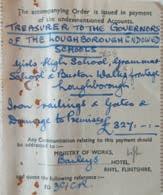











Peter Hopkins (LGS Staff 1960-1997) was in touch in the summer months to share some treats he had found in a reorganisation of his records. He wrote:
‘I have at last started to work through my collection of photographs. In a folder of informal pictures of individual people, I have come across six which I took in 1981 at the dress rehearsal of The Wizard of Oz, which was that year’s


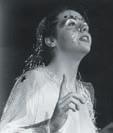
musical… The girl in the experimental sepia photo was in the chorus on stage. The others are a double-bass player (in profile) relaxing and watching the action on stage, two violinists and a cellist’.
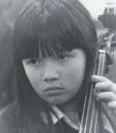
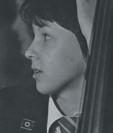
He suggested, quite rightly, that they might be of interest to others – and that others might be able to identify those in them as he has no record of their names. Do you recognise anyone?
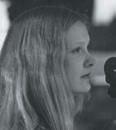
Can you help contribute to our collective history of this production?
Besides Peter finding these exactly 40 years after the production was staged, a further coincidence was that they arrived just as Fairfield were rehearsing their Year 6 production of The Wizard of Oz ready for an online recorded performance (COVID-19 yet again putting a spanner in the works and denying a live showing).
And I know that this is a show that must have been staged many times before here on campus – a 1996 production popped up when looking back to 25 years ago, for instance.
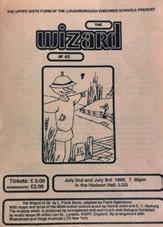

Adam Richards (Class of 1980) got in touch to send his apologies for not being able to attend the Decades Reunion this November – a trip from California is just fraught with too many difficulties at this time. Prompted by some words of John Weitzel’s, he also shared some memories of shows and life in school theatre productions back then. I asked him to tell us more, and together with his friend Peter Culver (Class of 1980) they have done just that.
‘Drama was an important part of our school experience in the years that we were at LGS’, Peter Culver and Adam Richards write.
Unlike today’s dedicated department and purpose-built facilities, it was extracurricular for both pupils and staff and centred exclusively on the Hodson Hall. The proscenium stage suffered from a serious lack of space offstage for scenery or actors. It was said that when it was being built there was a fly-tower included in the design but that the then Headmaster Mr Walter did not approve of “boys flying”. So, as a result, most productions had limited sets or had to alternate between scenes in front of the curtain and behind it with lots of “noises off”.
Our own experience started with the First Form Playwhich in 1973 ended with a full Trial by Jury in which Philip
Do you have memories of school theatre productions? Whether you were involved in them or just happen to have kept hold of a programme or poster from one, we would invite you to contribute your recollections or artefacts to our archives. Do get in touch if you have anything to share.



Reed’s (as Judge) cry of “throw your briefs upon the shelf” was greeted with a hail of underwear. We were both hooked. Adam joined the light crew under Mr Thomas in time for Pirates while Peter initially joined the sound crew under Mr Lane and then crossed over to lights.
At that point, the lights were controlled from a small concrete box backstage, Stage Right, that was reached by a ten rung vertical ladder just over the desk where the Stage Manager sat. The 12 channels were all mechanical rheostats, with a grand master fader that worked by locking the individual channels together and then winding a handle
furiously. Given the heat from the resistance dimmers and the need for several people to physically operate more complex changes, it was a true sweatbox and so, when not working, boys would literally hang out of the box, gasping for cooling air.
In terms of lighting effects, sophistication was absent, so invention was the order of the day. For example, when we needed the City of Worms to burn in Luther, Mr Thomas devised a box shape covered with strips of layers of coloured “gels” that when hit with a timber 2x4 “sensitively”, as he would implore us, would project the changing colours of flames across the set.
Each year the combined schools put on a Gilbert and Sullivan, a mid-school play and then for the third term there would be a staff play or musical. It was from this last item that the scale of the productions we attempted and especially the lighting changed to be much more ambitious.

The staff production of Joseph was that game changer. In that school year of 1976-77 The Mikado had followed She Stoops to Conquer so two solid winners were already in the bank. Our Joseph was the first fully staged amateur production outside a school where Rice and Lloyd-Webber both taught. The School even received a telegram from (now) Baron Lloyd-Webber wishing us luck on opening night. The biggest changes it wrought were because it was too big to fit the traditional stage. There had always been some additional staging that could be placed “out front” which would compete for space with the LGS orchestra during Gilbert and Sullivan, but the cast of 40 or more students in the chorus was on stage at all times and so necessitated a much bigger stage. In turn, this required the lighting to expand way beyond the traditional six spotlights, three washes and two specials. Lighting control was completely inadequate and so new “solid state” control equipment was brought, together with temporary lighting towers and lighting pipes which hung precariously using clamps gripped onto the roof trusses, right over the audience’s heads.
As Mr Thomas related in the Loughburian later that year, ‘...If the cast acted fearlessly, and the front rows of the audience showed no signs of nervousness, it may be that they were oblivious to the fact that the equipment dangling over their heads weighed one-third of a tonne.’
Especially for Joseph, ten colour change wheels that rotated in front of spotlights were rented “...red and green and yellow and pink and azure and mauve...” The darker colours would quickly burnout and rain strange smelling plastic onto the audience and cast.

The most memorable performance in the show for both of us looking back now was the song Those Canaan Days performed by beret-wearing, garlic-bedecked, gauloisesmoking, accordion-playing, moustachioed members of staff (many from the Modern Languages department) using outrageous cod French accents. With all this talent in a solid cast and Mr Campbell’s glorious band overcoming the lacklustre props, the success of the breakout musical that still “works” 40 years later was also ensured by cleverly including so many students into the production thereby ensuring a large audience. Joseph became a smash hit. The usual one-week run became two and then, due to conflicts with other uses for the Hall, after a pause it transferred to
the Loughborough Town Hall for a limited run for charity. Buoyed with this success, the lighting team was liberated from the sweatbox for good and set up shop in the “projection booth/kitchen” used for film club at the back of the auditorium - formerly the exclusive domain of Mr Lane and sound crew. Setting up lights for a show was a bit of a challenge because the ladder used had a habit of collapsing. This led, on one occasion, to our arriving to find the hall caretaker clinging grimly to a light pipe 30ft up! After that, a rented scaffolding tower was used.
Larger productions continued under the watchful gaze of Mr Weitzel as Stage Manager cueing the action via lights from Stage Right, and broke away from the Gilbert and Sullivan canon (there had been a Utopia Limited but not quite The Grand Duke) to put on La Belle Hélène and then came Die Fledermaus in 1980 As the student thespian acme of our time at LES, the Die F. “tour” to Buxton Opera House does stand out for us - mainly because we had to bring all our own equipment in vans into the space which was still equipped with lights and dimmers that were pre-war in nature. There’s nothing quite like rigging a 40lb light fixture 15ft up a ladder with no safety harness in the “Gods” itself, 60ft up from the stalls! This would never be allowed nowadays for men or boys. Once finished rigging, we both got to observe Henry Moss’ pantomime as a drunken jailor à la Buster Keaton, which never ceased to stop the show.
John Weitzel may recall that on one occasion Adam single-handedly destroyed the scenery on stage by trying to move a set of unused “flats” backstage which, overcoming his feeble strength, proceeded to domino-like “flatten” the entire set one earth-shattering piece at a time. While being questioned by Mr W as to how this could possibly have occurred, he very nearly recreated the “feat” - in something like a Jacques Tati gag. The great thing is that rather than being punished, he remembers he was simply thanked for his honesty, laughed at for his stupidity and repairs were made. It was truly a backstage theatrical “family”, in fact.
Our time on crew ended with the Advanced 6th review in 1980 whose “hit” was Mr Lane as a ventriloquist’s dummy cracking wise about the supposedly “hidden” new gymnasium. Overall, drama was a wonderfully broadening experience for both those on stage and off and we breezed through what was often a grim 1970s outside the school gates with élan. Together we had built up the productions to a standard that often rivalled professional theatres by a “can do” spirit and lots of very hard work. Halcyon days, ‘..do suy remember soz days in Canaan?’, indeed.
The reordering of the LHS Archive presented the opportunity to bring together all the information and materials we have on the Carol Service and tableaux.
I think everyone is aware that the Carol Service with tableaux is a long held tradition at the School and for many it forms one of their most enduring memories from their school days. Something of an urban myth had evolved that the very first Carol Service with tableaux was presented in 1920 - it was believed that Miss Bristol began the tradition and as she started her term as Headmistress in 1920, that date has become associated with the origins of the event. This would have made 2020 the centenary year of Tableaux. However, a team of three set out to prove (or disprove) this date once and for all over the summer as more and more treasures were uncovered in the archive. We could find no evidence to suggest the Carol Service with its famous tableaux

In last year’s Beyond the Barrier, I wrote about Charles McCurdy both as one of our three MPs but more in connection with his donations to the School’s library. This time I want to start by concentrating on his little brother, Edward. They were both boys here in the 1880s, the sons of Rev. Alexander McCurdy, the Primitive Methodist Minister for Loughborough when the Church was in Swan Street. They were living at 3 Burton Street so the School could not have been more convenient! At the time there were 117 boys in the School – 77 day boys and 40 boarders. Both boys were bright and we know from the Cambridge University Local Examinations that, in the Juniors, Edward achieved a 1st Class certificate. Out of 4844 entries he was top in drawing, 74th in maths and 132nd in Latin. In the Seniors, Charles achieved a 2nd Class certificate coming 31st in Latin out of the 660 entries. On leaving School, Charles went to Cambridge and Edward to Oxford where he showed his natural literary talent and wrote poems, serious and light.
His first book Roses of Paestum was published in 1900 but above all he became an authority on the works and personality of Leonardo da Vinci, being the first person to translate his diaries out of their original mediaeval Italian mirror letter writing. In recognition of this, he was made a member of the Athenæum Club where the Loughburians held their London Dinner in 2019. His first work on Leonardo de Vinci was published in 1904, followed in 1906 by a version of the Notebooks of Leonardo and in 1907 by The Thoughts of Leonardo. His major work was the
started in 1920 but through cross referencing a number of different sources there is sizeable evidence that it did begin life in 1925.
We feel that this discovery is something of a blessing. It means the 100th year has not been and gone, hampered by pandemics and restrictions and preventing a live audience from witnessing the spectacle. And it does give us plenty of time to plan for a fitting celebration.
A project to catalogue the evolution of the works of art used as tableaux over the years was completed this summer, although there are still gaps where we don’t have records. We are keen to fill these gaps and generally collect as much information, photographs and memories of Tableaux as we can over the next few years. Please get in touch if you have anything to share.
By Olivia Smith, Development Office o.smith@lsf.orgissue of a two-volume edition of the notebooks in 1938 which was then re-issued in 1948 and so far has run into 126 editions, the last in 2017. In the midst of this, he did write an acclaimed biography of Raphael Santi published in 1917.
In 1906 he married Sylvia Stebbing, the daughter of the Assistant Editor and First Leader Writer for The Times. She was a bookbinder who had trained Virginia Woolf in the skill as a therapeutic activity when she was not writing. On their marriage, she gave up her craft to concentrate on family life in Ashstead, Surrey raising their six children.
His first book of poetry The Lays of Limpet published in 1920 had an unusual content. ‘I may say that the verses, the fruit of experience of three years’ service in the Ministry of Pensions, are concerned mainly – perhaps more that proportionately –with the incidents of the daily work and the ways and doings of officials. And yet the desire was, above all, to pay a tribute to the great protagonist in the drams, the tragic figure in the background, disabled soldier or sailor, to whose needs all the others are engaged in ministering – however diversely.’ One poem that does not do this is the first To Alec, his first son born in 1914. A further book, simply called Poems, followed in 1925.
Unlike Charles, Edward kept in close contact with the School. In the May 1888 edition of The Loughburian he won a 5s (25p!) prize offered by the OL Association with a poem called The Seagull. He probably reflected later that entering was a big mistake as by that November he was Editor of the magazine (which in those days was produced by the OL Association) – a post he was to hold for several years - and by 1927 was Chairman of the Association.



Two years before that in September 1925, the son of a war widow entered the School. Clifford Dyment was born on 20 January 1914 to Welsh parents living in Monmouthshire but was actually born in Alfreton, Derbyshire, where his aunt to be was a hospital matron. As he writes in his autobiography, The Railway Game, ‘My father was very fussy about his pretty young wife and wouldn’t trust anybody but his sister to bring his first born into the world. And so it came about that I was taken to Alfreton in my mother’s womb and taken from it in a rush basket.’ In later life he was so ashamed of not being born in Wales that in his autobiography he writes, ‘I was born in two places. One, actual and official…The other, adoptive and private, has never been put down anywhere until now except in the Prefect Biographical Note which I used to draft in my rough book at Loughborough Grammar School.’!!
Four years later his father, William, was killed on 22May 1918 at the Somme whilst serving with the Lancashire Fusiliers. Seeking work as a sickness visitor, his mother took Clifford and his sister to Loughborough and he joined Rosebery Street School before joining LGS. He did not have a happy childhood as his mother’s work meant that they were left for hours every day to their own devices or the indifferent care of strangers. He spent a period with an aunt and uncle who treated him harshly. All this led to a series of illnesses through sheer neglect. He had chronic ear discharge and only partial hearing in one of his ears.
None of this was known by the staff at the School where his education was being paid for out of a fund for the children of men who had died in the war. He was in the middle or towards the bottom of his form. Comments on his record card reflect this. ‘Moderate progress’ ‘good but could do better’ ‘Slow but gradually improving in Latin. English and Maths weak.’ ‘Mostly fair. poor Latin: an ill-behaved shirker’ ‘Rather Lazy’ Might be keener in and out of School’ ‘Weak in Maths and Chemistry. Not strong’. He left the School at Christmas 1929 just before his 16th birthday whilst repeating the year in LVb, having become bottom the term before, with no School Certificate, and went to work in a bicycle shop. He moved from one badly paid job to another and for a time was on the dole. He was a commercial traveller for a while and an assistant in a Montague Burton outfitters.
It is likely, however, that repeating the year for just a term was to be the inspiration for his later life. At the end of that term, he was fifth and the comment was ‘Good, especially in English’ and this is the only clue as to why, when he was 20, The Listener published one of his poems and he was launched on a literary career. One of his first poems The Son was to become one of his most famous. It is not uncommon to read poems about the First World War written from the perspective of fathers, mothers, sister or sweethearts of men who had left to fight, but there are only two poems written by sons of soldiers. One was Ted Hughes’ Six Young Men written 40 years after the war ended, the other was The Son written in 1935.
The same year, 1935, his first published collection First Day
We hereby issue a full retraction of an email sent to alumni, between 2009 and 2012, advising of the death of David Saul

I found the letter in a cardboard box, Unfamous history. I read the words. The ink was frail and brown, the paper dry After so many years of being kept. The letter was a soldier’s, from the front-Conveyed his love and disappointed hope Of getting leave. It’s cancelled now, he wrote. My luck is at the bottom of the sea.
Outside the sun was hot; the world looked bright; I heard a radio, and someone laughed. I did not sing, or laugh, or love the sun, Within the quiet room I thought of him, My father killed, and all the other men, Whose luck was at the bottom of the sea.
contains an acknowledgement that his thanks were due to the editors of The Listener, London Mercury, Bookman, Poetry (Chicago), Time and Tide and The Year’s Poetry for printing his poems. During World War II he was engaged to make films, working with the British government.
However it was his early childhood in Caerlon-on-Usk that was to be his greatest asset. He regarded himself as a Welshman and Dylan Thomas, who was the same age as him, befriended him with their common Welshness proving a strong bond. He arranged for Clifford to write the words for one of the films on life in the British Isles made by the BBC Film Television Unit as a contribution to the Festival of Britain. He repaid Dylan by letting him sleep at his flat when Dylan was too drunk to go home! But, on the whole, Clifford did not get on well with his fellow poets. They frightened him and, an odd man out among men, he felt an odd poet out among poets.
Just before he died in 1971, his collected poems were published with one poem ‘As a boy with a richness of needs I wandered’ included by Philip Larkin in the Oxford Book of Twentieth Century English Verse and he was made a Fellow of the Royal Society of Literature.
In 1973 his friend Robert Greacen, a literary critic, visited the School on the 20January, Clifford’s birthday, and gave a selection of readings in School Assembly. This tradition was to continue for the next few years with Wilf Massiah, the School’s librarian, choosing appropriate pieces so the ‘ill behavedshirker’ was not forgotten!
(Class of 1962). During this period, the Development Office received notification of David’s death and this information was subsequently disseminated to our alumni community. We are please
to confirm that David is alive and well and living in the Philippines. David has recently reconnected with some of his school friends and can be contacted directly through Loughburians Live.
LGS STAFF 2001 - 2019
Grant joined the School from Lincoln Minster School as a Business Studies teacher and also Director of Hockey in 2001. That seems a rather bland statement and hides the true story of this remarkable man.
His previous life was in Zimbabwe where, after doing National Service, he was a farm supervisor for a wealthy Arab family. When the troubles began there, the Sutcliffe’s emigrated to England with just £200 in their pockets leaving all their possessions behind. Grant found work for a local landscaping company but working with young people was his true calling and so he trained as a teacher.
He was an inspiration in the classroom, but it was on the hockey field that he was to make his mark and firmly cement himself in the School’s sporting history. He re-invented the game, all the more remarkable because he didn’t have a pitch at School available to him. That was not a problem, just a challenge, to a man with his background. Hours booking and then spending time on buses to the University and St Margaret’s in Leicester were to dominate all the time he was at the School.
His objective was to move Hockey from being a minor winter sport to stand shoulder to shoulder with rugby. Not only did he achieve that, but he managed to transform it into the major winter sport with tremendous success at senior level as the fruition of the hours spent with the junior teams paid off. However, in addition to not having a pitch available to him, he didn’t have any staff to help him either until Jez Clarke arrived. Again, he overcame this by creating a club at the School –Loughborough Sharks, named after his favourite rugby team the Natal Sharks – which could use the High School’s astro when they didn’t need it.
In the end, in addition to ten School teams, the Sharks had three men’s teams and two mixed teams playing in the national and local leagues, enabling boys from the youngest age to play with and against adult players. The sight of a team of 14 year olds playing a team of 50 year olds is a lasting memory! Through this pathway he created fine players – none more so than the Great Britain international David Condon – who still play regularly and have leadership roles in hockey clubs all around the country and abroad. For anyone involved in School Sport that has to be your aim.
Tragically he was diagnosed with an inoperable brain tumour a few months before his planned retirement in 2019 but was able to attend the opening of the new Astroturf pitch appropriately named after him in April 2019. In the following months he showed great peace and fortitude in battling his illness until he died on 13 December 2020.

LGS STAFF 1971-1992
Betty Cooper retired in 1992 after 21 years as Assistant Secretary. She was one of the few non-teaching staff well known to the boys: her front-line position in the General Office made her not only the first contact with school visitors to Buckland, but also the source of lunch passes for boys who had forgotten their lunch cards. However, the acquisition of these vital passports by hungry but forgetful boys was a procedure somewhat akin to Daniel venturing into the lion’s den! Her other main task was typing the long U.C.C.A/P.C.A.S. references and over the years she must have produced thousands of these vital reports, helping to launch a generation of boys into their post LGS futures in Higher Education.
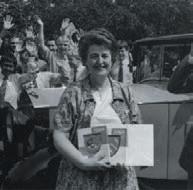
On her last day, she was chauffeur driven home with her husband in a vintage Rolls-Royce, driving in state through the Walks which were lined by hundreds of boys waving farewell with fluttering lunch passes! She died on 14 February 2021.
CLASS OF 2001
Peter left the School with 9 GCSEs in 1999, however, it was to be the Bridge he learnt in the 10+ exam seven years earlier that was to lead in 2005 to him pursuing his career as a professional poker player. It turned out to be the right decision as he went on to win more than $1,142,871 in 28 poker live tournaments alone. In all-time money ranking he was ranked 114 in England and 1837 in the world. His biggest success was winning $487,006 in one tournament.
Within the poker fraternity, he was a pretty controversial figure with a massively aggressive playing style and he generally thought all other players were idiots compared to him. A fellow player said: ‘You didn’t ever want him at your table, he used to be relentless.’ He was a unique character and a huge loss to the game when he died of a heart attack in April 2021 whilst playing in Mexico.
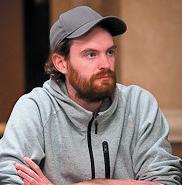
Trevor joined his brother, Barrie, from Miss Horner’s West End House School in Beeston as a 9 year old in September 1942. Both brothers boarded in School House with Mr Pullinger and had many, mostly happy, memories of the war years at the School. Trevor was brighter than his brother, who unfortunately had troublesome sinus problems which led to him leaving in 1945 to go to Rossall School on the Fylde coast where the sea air was beneficial to him. Trevor followed two years later after five very successful years, ending up in the top five in his form.
At Rossall, he became Head of House, a Company Sergeant Major in the Army Cadet Force and an active performer in School plays and operettas. He continued to blossom academically and in 1952 won not only a place at Emmanuel College, Cambridge, to read Medicine but also a County Major Scholarship for Nottinghamshire based on his outstanding exam results. After completing his pre-clinical training at Cambridge, he transferred to Guy’s Hospital in London in 1955.
There he met his future wife, Elizabeth, who he married in 1959. During his honeymoon, he was summoned to do National Service and, not wanting to leave his new wife, he cleverly used the let-out clause allowing him to join the Colonial Service where wives were accepted. Thus, they headed to Northern Nigeria where he found himself running the District General Hospital aged just 26 with no knowledge at all of tropical medicine!
Six years later, he returned to Gloucester, then moved to Birmingham and finally Newcastle where he was Senior Registrar at the RVI and Princess Mary Maternity Hospital.
Whilst at Rossall he used to enjoy reading the lessons in Chapel and won the Chapel Reading Prize; through his flatmate in London, he joined a Christian Club in Kensington. In Newcastle he and Elizabeth joined Heaton Baptist Church and they soon found they were visiting other churches and taking services for congregations which lacked a minister.
His final move was in 1970 to Cumbria to be a Consultant Gynaecologist where he also became a Reader and in his spare time became addicted to fell walking and running. He was still active in his 80s when he cycled with a close friend from Land’s End to John O’Groats and he remained fit until his death in April 2021.

Roger Bryan Hill (1930-2021) has died at the age of 90 after a very well-lived and successful life. Roger was School Captain in 1948/9, as well as being Cricket Captain for two years, Football Captain and Head of East House. Roger had been the oldest living School Captain and it was a shame that COVID-19 restrictions meant that he was unable to attend their reunion event that had been planned in 2020.
Roger had a great passion for cricket, playing regularly for LGS 1st XI. Recently, he could still remember his disappointment of cycling many miles to play a cricket match in summer 1945, only to find it had been cancelled – something to do with winning a war, which apparently wasn’t as important as cricket to a 14 year old. Roger excelled in science as well as in sport, running the LGS Science Society and so, after LGS, it was no surprise that Roger pursued a career in science, studying for a BSc, MSc and PhD in Metallurgy at the University of Manchester. Roger then worked in London for the Central Electricity Generating Board, advising on the design of nuclear power stations, until his retirement in 1988 when the CEGB was privatised.
Roger was born in Birstall, Leicester in 1930 and was an avid Leicester City supporter, delighted to go to the old Wembley Stadium to watch them win the 2000 League Cup final. Roger played cricket most of his life after LGS, for the University of Manchester and then Bexley Cricket Club, where he also coached young cricketers, and was a scorer and umpire. He also researched the history of Bexley Cricket Club, producing two books on its history and its Presidents (of which Roger was one in 1985).
Roger cared about the natural world, concerned about the importance of retaining London’s green belt and ensuring the local council supported biodiversity. He enjoyed watching birds and in later life raised funds for the charity ‘Butterfly Conservation’; he was proud to help support them to buy a nature reserve to conserve insects.
Whilst at LGS Roger became firm friends with Owen Vann (Class of 1950), who shared his love of cricket, competing against him in ‘science’ versus ‘arts’ LGS cricket matches, and being a student and playing cricket with him at the University of Manchester. Roger met up regularly with Owen (always called ‘Oscar’ by Roger) throughout his life, sharing great stories of cricketing and school days amidst roars of laughter. A friendship started at LGS when they were 11 was still going strong nearly 80 years later!
Roger is survived by his wife Margaret, who he married in 1956, two children Richard and Jane, and five grandchildren; sadly his elder daughter Jennifer and grandson Matthew predeceased him.

CLASS OF 1948
Two weeks after Roger’s death, another member of that 1948 Cricket Team died. He was only at the School for one year, transferring from King Edward Grammar School, Coalville, when his father became Police Inspector in Loughborough. As you might expect from his height, he was to be a quick bowler and was awarded his colours after heading the bowling averages with 36 wickets at an average of 6.22. In the Loughburian, Roger Hill wrote this about Colin:

C.E.Shaw – This medium fast bowler has made remarkable progress during the season. He swings the ball late either way, and at the end of the season was maintaining good length and direction. Unfortunately, he is a bad fielder and a worse batsman.’!!!
In fact, Colin played his first cricket match aged nine and his last on his 70th birthday in 2000, so he played in eight separate decades and played in the Nottinghamshire 2nd XI for ten seasons.
After school, he did his National Service in the Royal Navy Fleet Air Arm, serving on aircraft carriers out of Malta, and played cricket against Prince Philip. He then trained as a teacher at Loughborough College and started at Bramcote Hall Prep School in 1952, teaching PE and geography. The whole school moved from Bramcote in 1965 to Gamston in North Notts and Colin continued there for 41 years until his retirement in 1993.
Many pupils remember him for his commitment to
CLASS OF 1992
principles, sportsmanship, tradition and fairness. As well as his formal teaching, he led school trips on motor cruisers to the Norfolk Broads, taught pupils to fish and appreciate the natural world and had a skill for recognising and nurturing specific talents in those who were not academic or sporty. He coached juniors at Trent Bridge for many years.
Colin, with his wife Rita, enjoyed a long, active and happy retirement from their home in Milton. They travelled extensively including a three month round the world trip, trips to Malta and visits to their daughter in South Africa and Australia, often coinciding with cricket or rugby tours!
He continued his commitment to cricket, living overlooking Milton Cricket Club ground, and fulfilled every possible role as player, umpire, coach, President and groundsman. He watched a match at the ground just two days before he died and especially enjoyed the first proper cricket tea allowed after COVID rules relaxed.
Colin married Rita (née Pears) in 1954. They were married for 63 years - Rita predeceased him in 2018. They have three daughters (Sally, Claire and Joanna), seven grandchildren (two of whom play high level cricket) and one greatgrandchild to be. Owen Vann was their best man and is Sally’s godfather.
Colin lived independently, drove locally and walked daily until his death, aged 90, peacefully at home in his sleep.
Edward joined my form, 3W, from Stoneygate School at 13+ in 1987. Teaching him, it was soon clear that he was a fine Mathematician and was always in a battle to see if he could be top of the form. However, as he progressed through GCSEs it was apparent that he was stronger and showed more interest in Modern Languages and took Geography along with French and German at A level. He achieved straight As at A level and won a place at Selwyn College, Cambridge to read French.
“Her smile could light up a room. Her sense of grace and loveliness touched many and will never be forgotten. She benefitted many in innumerable and sometimes unrecognisable ways”.
(Friends remembering Joan)
Born 9 November 1936, daughter of Tom Hancock, Registrar and Kay whose grandfather had been Town Clerk.
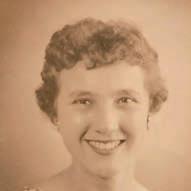
Joining in 1946 were Doreen MacLean (née Frost), a friend from Junior school and Margaret Marr (née Morris); Margaret recently wrote: “On my first day, I was a lonely frightened little girl and had recently lost my father, but Joan came up and said “I think I know you” - those words saved me.” The friendship lasted a lifetime. All three married engineering graduates from the college, Joan and David on 10 July 1959. They had two children, Mark and Jill.
Joan and Doreen kept in touch as their husband’s careers developed in different industries but close locations. Margaret moved to America but found ways to meet up with Joan around the world. In 2013 they acknowledged the 60th year of leaving with a visit. Amazed at the changes but pleased to see stability and traditions upheld, they were proud to be alumni.
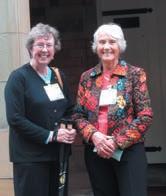
School stories oft related to the family; Joan was particularly proud of her Domestic Science Prize– Mrs Beeton’s Cookery Book used through her life.
Joan and David lived mainly in the Cotswolds but moved to Florida in 1997 where they spent 19 years, returning to the UK and settling in Perthshire.
Joan was diagnosed with cancer in 2016, fought it bravely and passed away on 21 October 2021. Survived by her husband, David, two children and three sisters.
LGS STAFF 1973 – 1996
Mary Kirk joined the staff in September 1973, having taught locally for some years. “We need somebody good to look after the CSE set, Mary; you’ll cope,” is how Colin Tivey greeted her! So Mary immediately set to work on her middle school teaching, which she did so well and which was to be her main ‘stamping ground’. She took all the changes in syllabus in her stride and produced excellent results from her warm rapport with all her pupils. ‘Madame Kirk’, like most experienced colleagues, became an institution. Not only did she add a much-needed charm and elegance to the Modern Languages Department, but she also brought her guile, wit and ‘feel’ for what was right for teenage boys.
Outside the classroom, Mary’s other tour de force was her acting. The Hodson Hall stage was graced by her inimitable
I have always tended to remember the first time I ever met a boy and with Joe this was definitely the case – it was with a fractured wrist within two weeks of entering the School from Swithland Church of England Junior School on a Scholarship (he was 6th in the entrance exam) in 2006.
He soon set about his work in a quiet, efficient manner and continued to show he was a fine academic. After all As and A*s at GCSEs he embarked upon an interesting combination of A levels in Maths (always his favourite - he scored 96% in the entrance exam), Spanish and Politics.

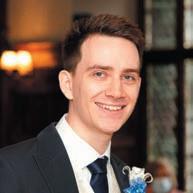
Outside the classroom, with his wrist restored, it was hockey that drew his time and attention and that enabled him to continue his close friendship with Nick Ouseley who he had sat next to on their first day in School (both Os in the register!). He played for all the age group sides and his happiest memories were associated with the tour of the U16 XI to South Africa at Easter in 2011. He then went on to play regularly for the 2nd XI and he described hockey as his passion.
On leaving School, he went to the University of York to read Computer Science and at James College, in his first term, met Laurel who he married in August 2020. However, also in the August, he was diagnosed with cholangiocarcinoma and the speed with which this rare and aggressive disease progressed for Joe was devastating. He died on 27 November 2020, aged 25.
presence on many memorable occasions. Starting with Joseph, she then featured in all the Junior Musicals and staff pantomimes. She also accompanied trips abroad, most notably to Paris and Brittany, where her artistic recreation of Versailles Palace on the beach at Dinard – a vision in sand, shells and flowers – will always be remembered.
She enjoyed retirement with her husband, Stuart, until his death and then with her son Charles (Class of 1985) who moved north to look after her until her death on 7 January 2021.
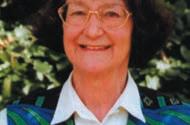
LHS STAFF 1992-2013
“When Mum was diagnosed with incurable cancer she said that she’d had a great life, regretted nothing and was only disappointed that she could not keep on supporting her family and friends for a little longer.
She took it all calmly. Her life mantra was ‘never make a drama out of a crisis and above all, stay cheerful and optimistic.’ She never gave up and always kept things in perspective”
Jonathan Starkings as part of Megan’s Eulogy
Megan Starkings taught at many local Schools before joining Loughborough High School where she worked for more than 20 years prior to her retirement in 2013. She taught physics and looked after the younger pupils in various pastoral positions as part of the SLT. She organised a huge number of extracurricular activities, an annual Year 11 walk, physics trips to CERN, bridge, chess and even Go clubs. She was part of the famous trip to Iceland which clashed with a volcano erupting and featured on the national news. Her famous hospitality ever-present, she was even involved in giving a couple of Grammar School Boarders a home for seven years. She is fondly remembered by former pupils who recall her excellent teaching, wicked sense of humour, compassion and, above all, immense patience.
Family was always the most important thing to Megan, having been married to Mel for 50 years, raising their three children, Jonathan, Lora and Peter. She was always available and would make time for any member of the family. She was a safe port of call and was there for all her children in a crisis. She adored her grandchildren and supported Lora through her journey as a foster parent, caring for each child as her own.
Megan had many talents, playing bridge at the highest level as well as travelling all over Europe with the England Junior teams. She was an active member of Charnwood Tennis Club and in retirement seemed to be playing there more often than not.
LHS
BY
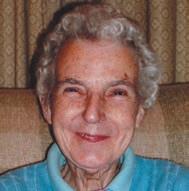
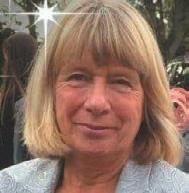
My mother, Marion, was born in Mountain Ash in South Wales in 1931. She was a clever girl at school, but it was in music that she particularly excelled, especially singing. She had a beautiful mezzo-soprano voice and in 1946 won the Welsh National Eisteddfod for girl’s solo singing in the under 16 age group. Three years later she won a scholarship to study singing and piano at the Royal Academy of Music in London, gaining an LRAM and a GRSM. During her time at the Royal Academy, she sang in a number of choirs, including the Sir Thomas Beecham Choir, the Royal Philharmonic Choir and the London Mozart Singers and won several prizes. After graduation in 1953, she took up a number of teaching posts in Surrey and Kent. She married in 1957 and moved to Cornwall with her husband, Brian, a Methodist minister. It was in Cornwall that her family was born. In 1964 the family moved to Leicestershire and Marion threw herself into the busy life of a minister’s wife and mother to two small children.
She enjoyed walking, aiming to walk 300 miles per month. This proved too easy and her target was soon revised upwards to 500 miles. An accomplished needlewoman, Megan always looked bright and stylish in her own creations and had a perfect model in Mel, with whom she worked to design and create his infamous attire. He showcases their collective endeavours with great pride and aplomb. Many in her family have items she has either designed, created or altered, and her grandaughter’s dollies all fight to wear the coveted Spiderman dress created by Gran!
Throughout the 70s she watched Nottinghamshire Cricket Club and enjoyed many other live sport events. She loved rugby and was a season ticket holder at Leicester Tigers for the last 20 years. She was a passionate fan who would often apologise to others sitting near her for the volume of her support, because she felt if they lost, it was partly because she hadn’t encouraged them enough.
She loved the theatre, and it was fitting that the last production she ever saw was the Foundation’s excellent production of Les Misérables - a show she loved and had seen probably ten times.
Megan was a wonderful, strong woman, who knew her own mind. Above all, she loved her extended family. Any visitor to the house was shown her extensive collection of photos which occupied every available surface; she told the sort of anecdotes only the very proudest of Grans could get away with.
Following the sudden death of my father in December 1967, she returned to teaching and took up a post as a teacher of piano and singing at LHS in 1968 where she remained for 30 years. She was both an inspirational and conscientious teacher taking a deep interest in her pupils and their future careers. She also took part in the early joint musical productions with the Grammar School and maintained a lifelong love of music.
Both before and after retirement my mother continued to be deeply involved with her local Methodist Church and the Sunday School. She took great pleasure and interest in her family and friends and was so proud to become a great-grandmother for the first-time last year. She sadly passed away in September 2020 following a period of ill health and is greatly missed.

 By Dave Barnett (Class of 1977)
By Dave Barnett (Class of 1977)
The start to the 2021 season was delayed due to yet another COVID lockdown but it eventually got underway at the beautiful Stanton on the Wolds course on a wet and windy day on 20 May with Jon Soars (Class of 1980) coming out on top with a highly creditable 38 Stableford points, followed by Dave Barnett in second spot with 34 points.
The next event was the Quincentennial Trophy at Rothley Park Golf Club, where the longest drive was clearly won by John Stanion (Class of 1961) driving up from Essex to play at Rothley, the club he joined as assistant golf professional some 50 years ago! The winner of the Quincentennial Trophy, on a perfect July day, was Rothley member Tom Duckworth (Class of 1982) with 41 points and the leading Loughburian on the day, and winner of the Loughburian Salver, was Roger Inkley (Class of 1981) with 38 points.

Our annual match against the Foundation Schools was played at Longcliffe on 21 September where six boys and two members of staff were narrowly defeated by a strong Loughburians team and so the Loughburians retained The Salver.
One of the highlights of the season followed when our team of Simon Cockbill (Class of 1977) & Jon Soars, Achilleas Hatjiosif (Hatj) (Class of 1976) & Nick Chappell (Class of 1976) and Dave Barnett & Steve Foister (Class of 1978) eventually won The Old Pupils Golf Day at Luffenham Heath Golf Club on 24 September, running out clear winners by three Stableford points from Oakham in 2nd and Stamford 3rd.
This was followed by the real highlight of the season when the Grafton Morrish team went to the Finals in Norfolk at the beginning of October. Despite being very narrowly knocked out of the main tournament in the first round by a very strong Sutton Valence team, they then recovered to show their true class by winning the plate completion (The Committee Bowl) by defeating Birkenhead in a closely contested final which they eventually won on the third extra hole!
The Grafton Morrish Finals were then followed by a tight match against Nottinghamians at Hollinwell in early October where the Loughburians triumphed by two matches to one to retain the trophy played for each year.

The season was rounded off with the Autumn Meeting at the outstanding Coxmoor Golf Club where Jon Soars equalled Richard Underwood’s (Class of 1988) feat from last year of winning both the Spring and Autumn meetings. Jon won with a score of 38 points pipping Chris Fountain (Class of 1975) into second place by one point! Congratulations Jon, on a terrific season of golf!

The annual fixture for the Sam Yaxley (Class of 2004) trophy took on a different format this year with two teams of Loughburians, augmented by School 1st XI players, selected to commemorate the lives of Naveen Suri (Class of 2004) and Charlie Wood (Class of 2018) both of whom were keen School cricketers and had died since the last game. Before the game, Charlie’s parents presented two benches in his memory.

Nav Suri’s XI batted first and got off to a blistering start. Joe Purvis (Class of 2010) batted just as he did at School with a 100 off 68 balls comprising six 6s and ten 4s and when he retired the score was 159. Fellow opener Dylan Church (Class of 2020) finished on 69 and Captain Anish Patel (Class of 2008) scored a quick 50 as they amassed 253-6 in their 40 overs.
This always looked as it would be more than enough but a spirited reply by Charlie Wood’s XI captained by Freddie Towne (Class of 2018), was led by James O’Kelly (Class of 2018) who scored a quick 50 and an excellent partnership by the Royle brothers, Charlie (Class of 2017) and George (Class of 2023) saw them end up on 230-7.
The annual match between the Loughburians and Elvaston C.C. in memory of Sam Yaxley had an explosive start and a
dramatic end. Batting first, Elvaston scored 38 off the first two overs before being restricted to 230-7 off their 35 overs with Ed Collins (Class of 2008) taking three wickets. The total looked out of reach until a 74 run partnership between Andrew Wray (Class of 2004), 35 off 26 balls, and David Tew (Class of 2013), 83 off 72 balls, saw the prospect of an unlikely victory. Craig Ashcroft (Class of 2004), 30 off 24 balls, saw the OLs needing two off the last ball to win but could only score one leaving the match tied….and the last three scores all being 230-7.
Trying to get ‘equal’ teams is the challenge for both Captains in the match against Leicestershire Gentlemen. As if that is not enough of a challenge for Dharmist Bathia (Class of 2011) who runs this match for the Loughburians, a greater challenge is finding Loughburian bowlers. Thus forced to bat first on a damp wicket the Loughburians soon lost both openers and it was left to Aiden Morris (Class of 2011) and Johnathan Orchiston (Class of 2010) to both hit 50s to get the Loughburians to a respectable 209 off their 45 overs. However this was never going to be enough as Leicestershire Gents hit 80 without loss off the first ten overs, but a spirited fightback finally saw them to victory by just four wickets with three overs to go.
23 APRIL 2022
We are delighted to host the Loughburians Gala Dinner at Plaisterers’ Hall, London, on 23 April 2022 at 6.30pm. Originally planned for November 2020 to celebrate the 525 anniversary of Thomas Burton’s legacy, the Gala Dinner has been reimagined to appeal to all alumni across our family of four Foundation Schools.


If you haven’t attended one of our London events before, this could be the one for you. Partners are very welcome and we’re aiming to make this the largest alumni gathering in living memory. Come along to celebrate all that is great about our community, reconnect with old friends and hear about how you can get involved in the Schools today.
Tickets: £90 each - Tables: £800 for a table of 10
Why not get together your year group or sports team to form a table? Book your tickets online now at Loughburians Live or by calling the Development Office on 01509 638920.
With special thanks to our friends at The Worshipful Company of Plaisterers, particularly Prof Hubert Lacey (Class of 1963) who was instrumental in securing this prestigious venue.
We hope you have enjoyed reading this edition of Beyond The Barrier –the magazine for all Loughburians.
You will have noticed that many of our articles have been contributed by various members of the LSF Community.
We would welcome any contact or contribution that you wish to make. Please contact the Development Office on 01509 638920 or alumni@lsf.org
 Front Cover Photo
Skylar Smith and friend at the LSF Nursery
Front Cover Photo
Skylar Smith and friend at the LSF Nursery